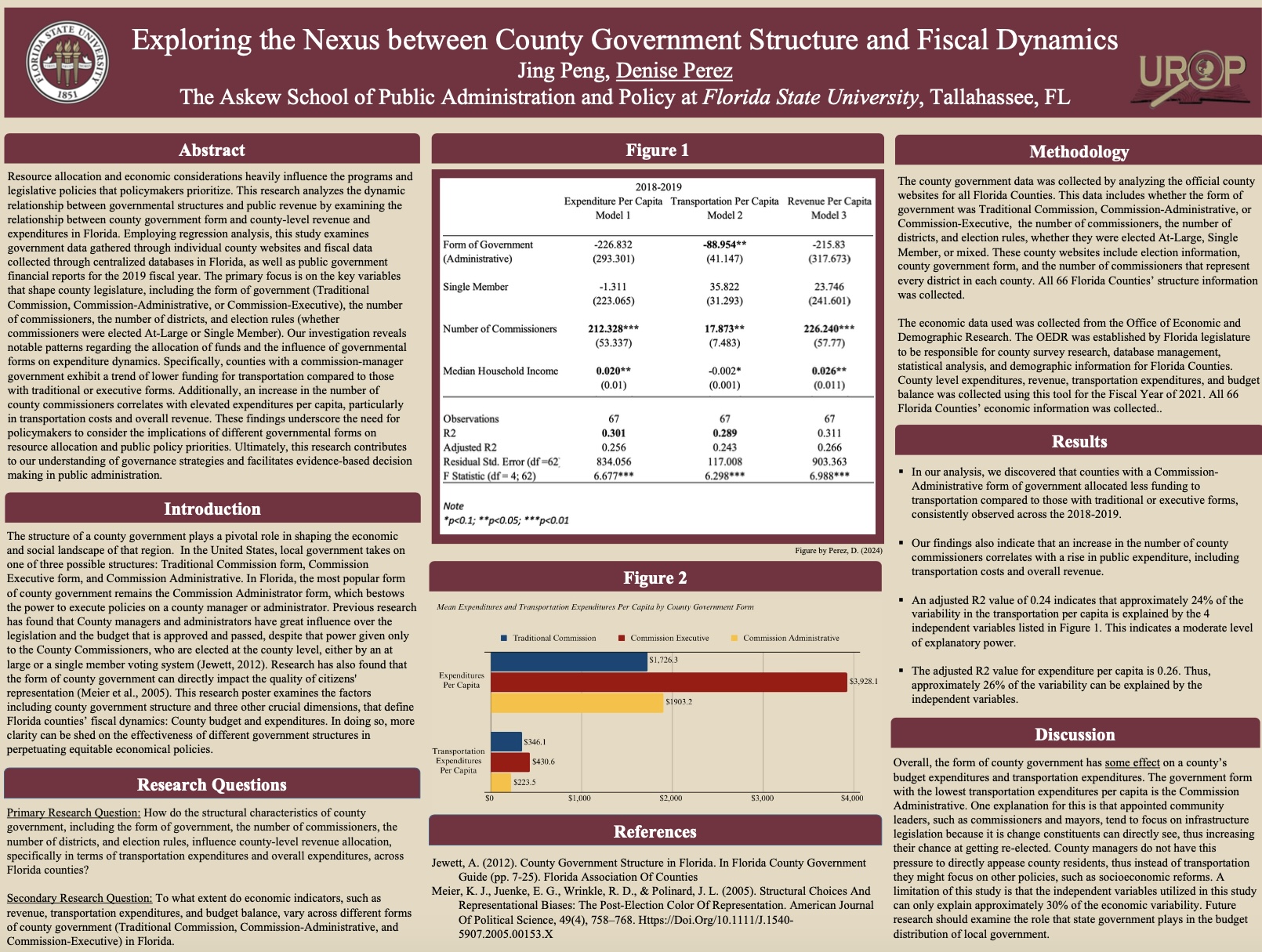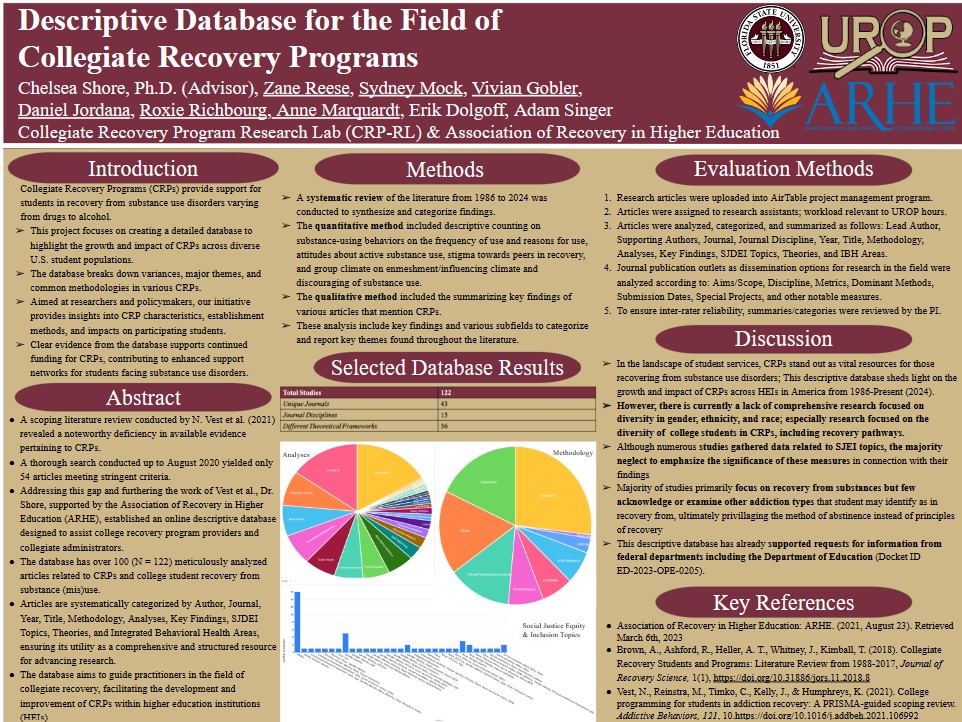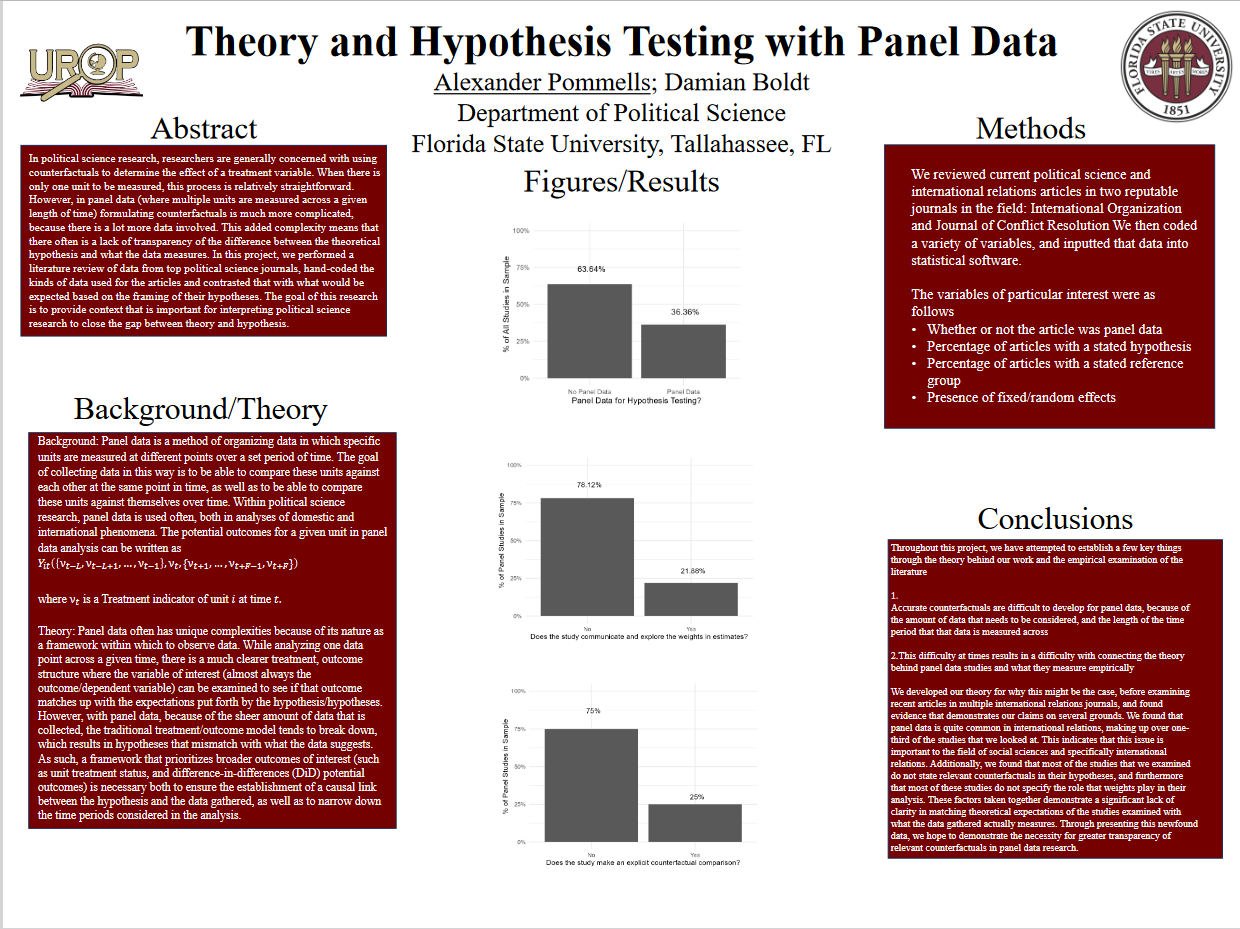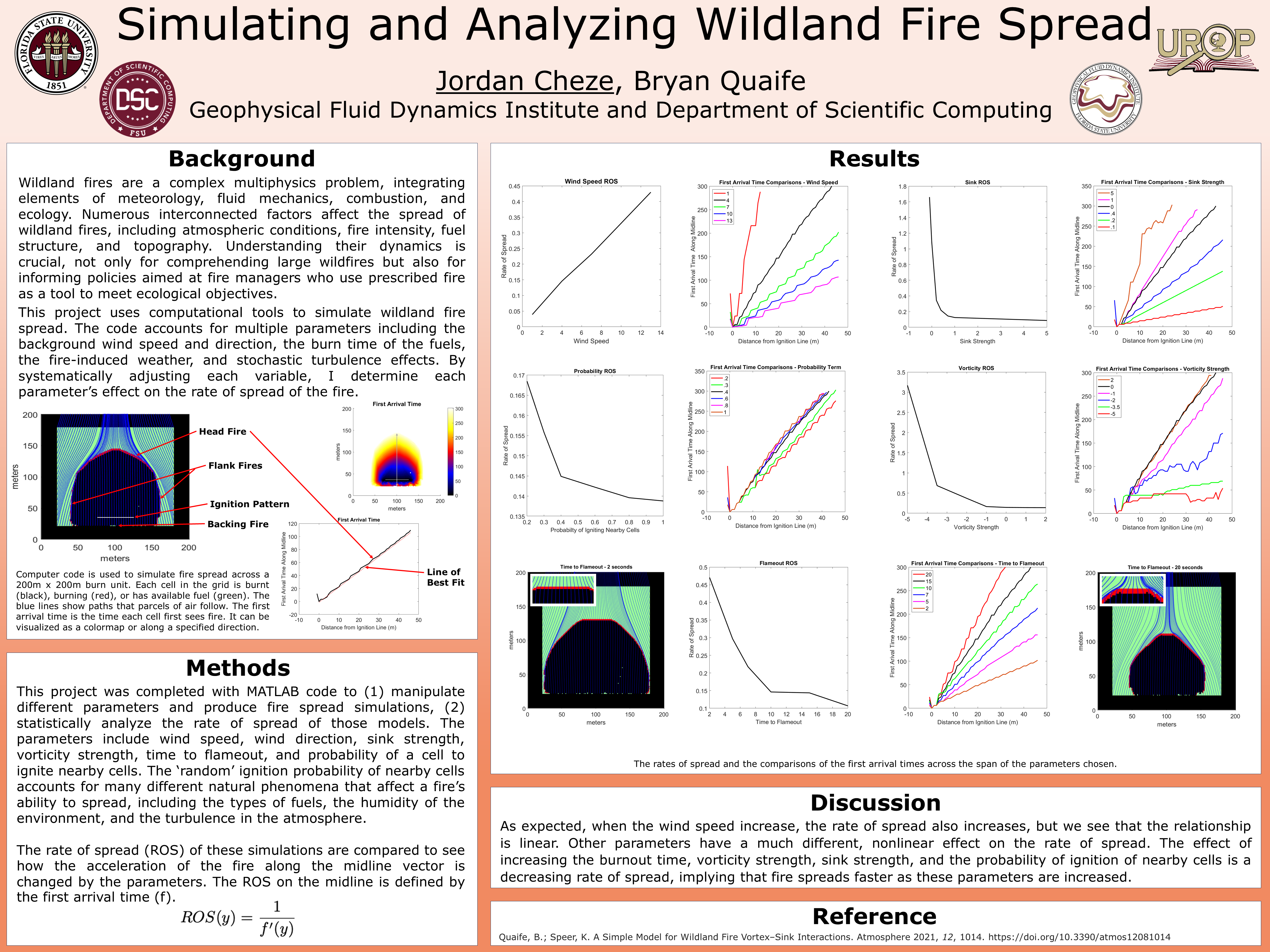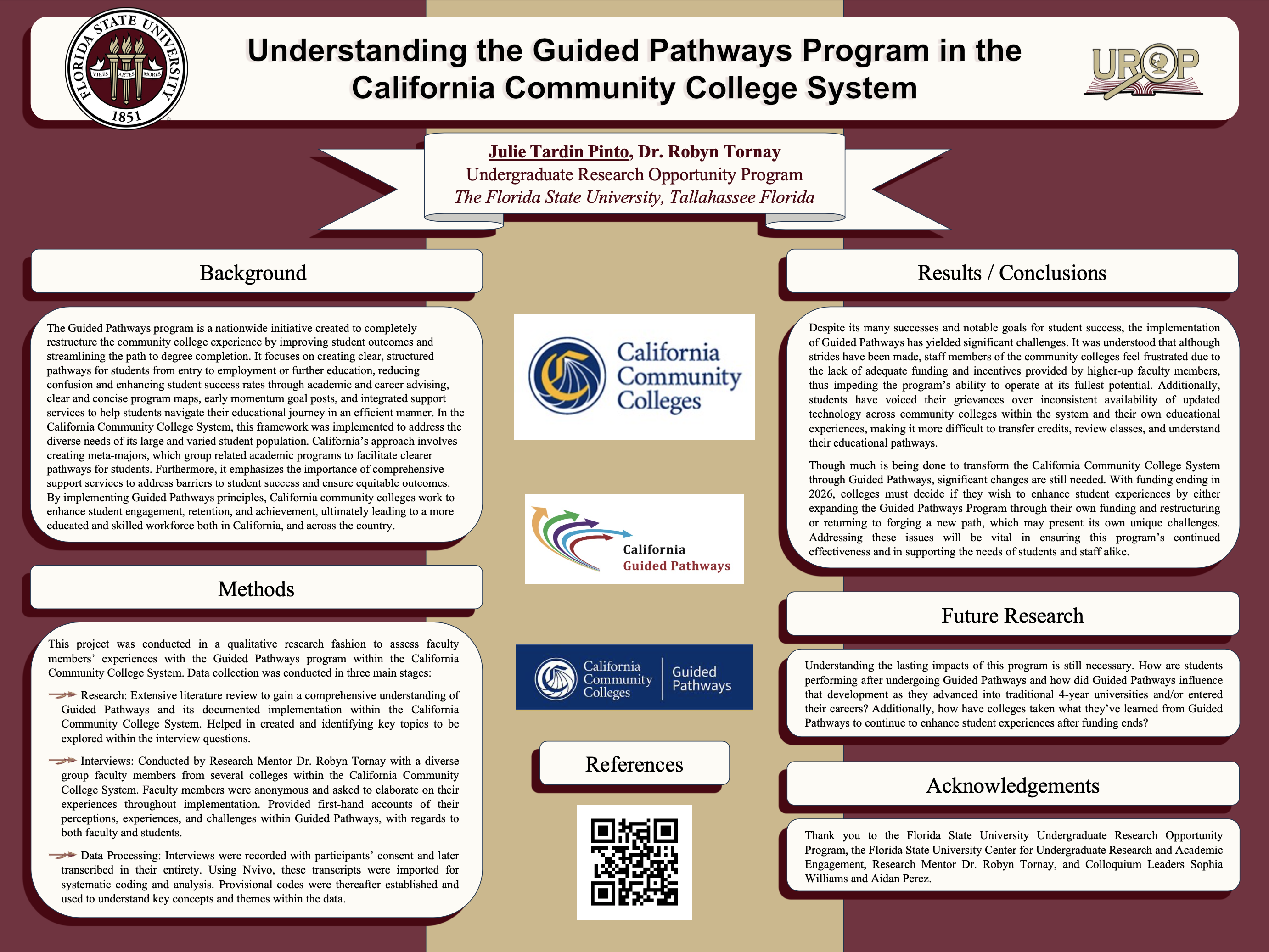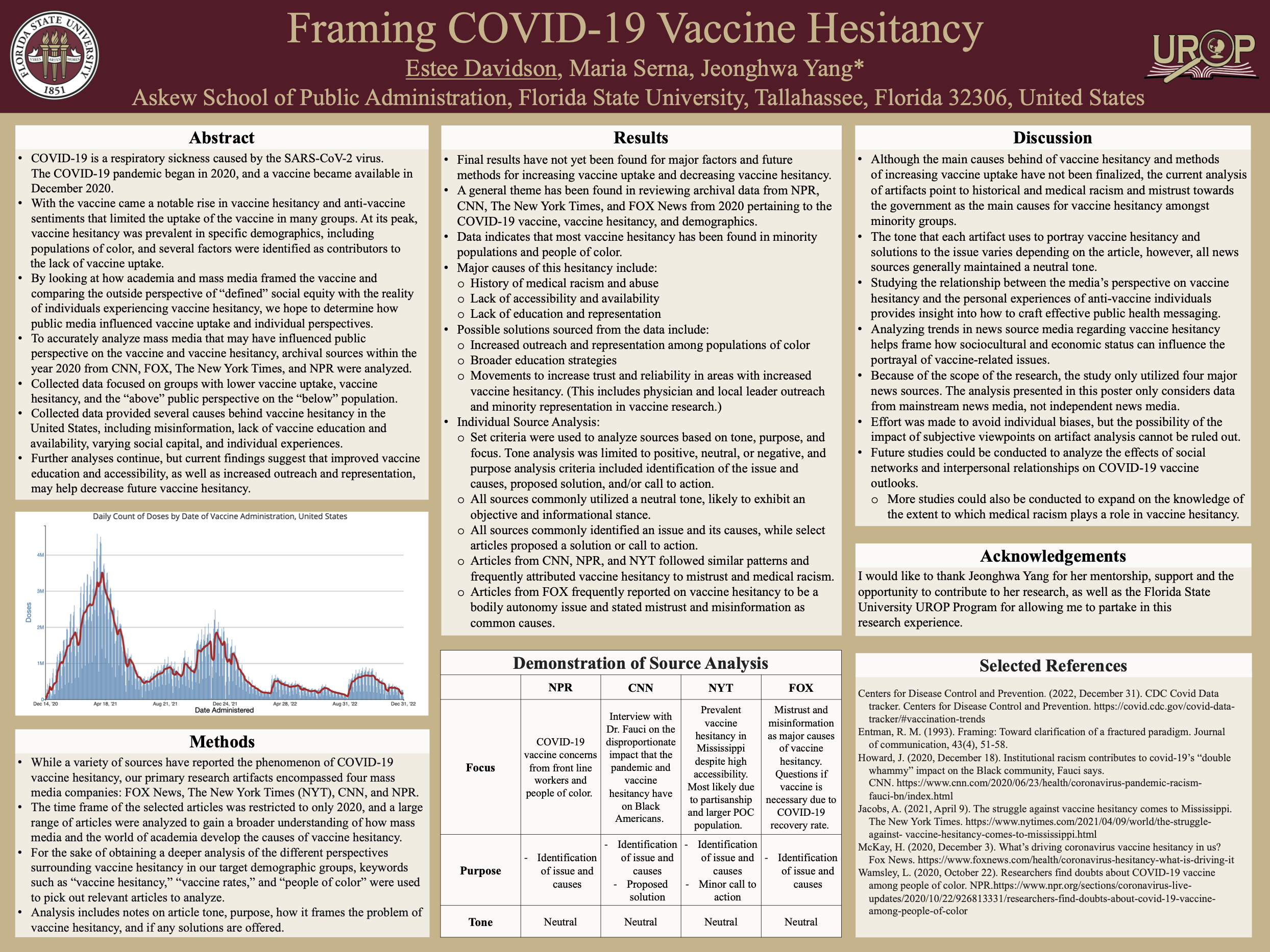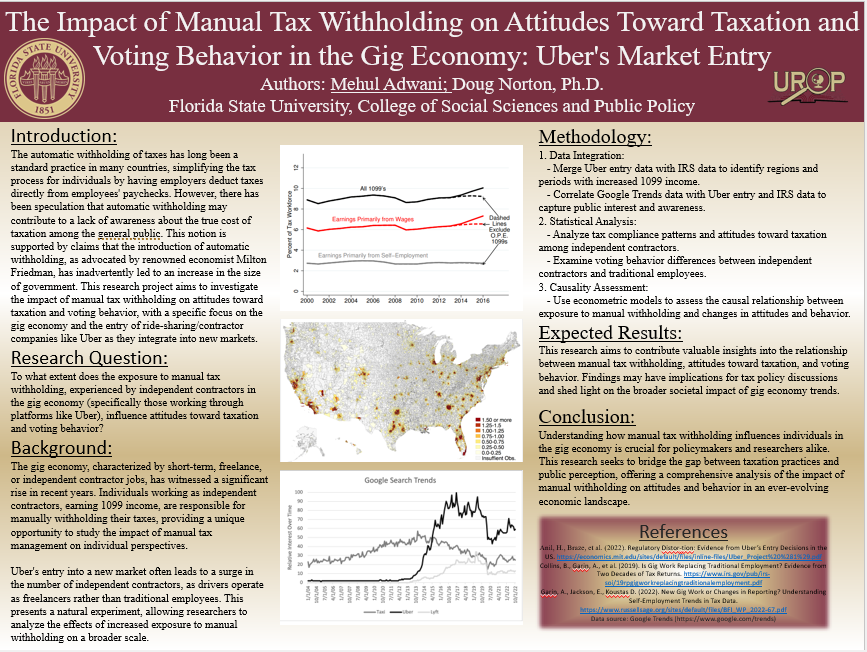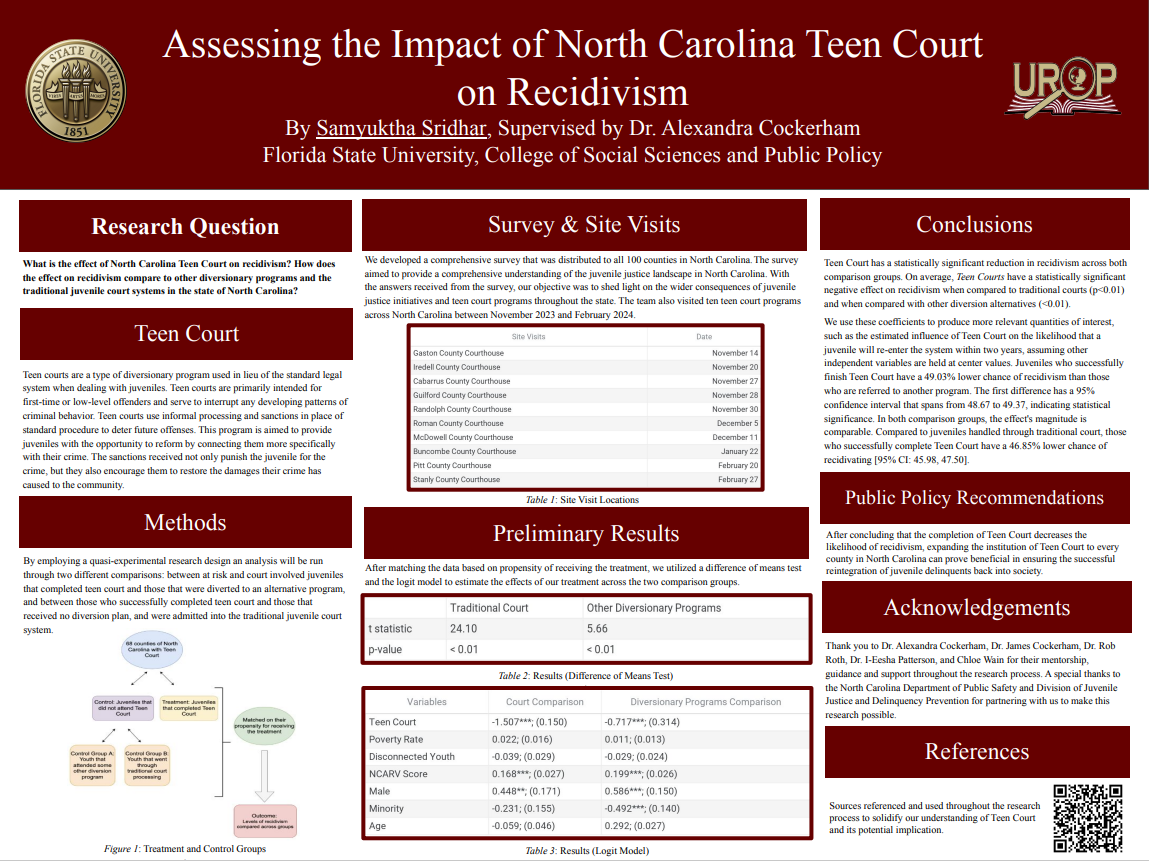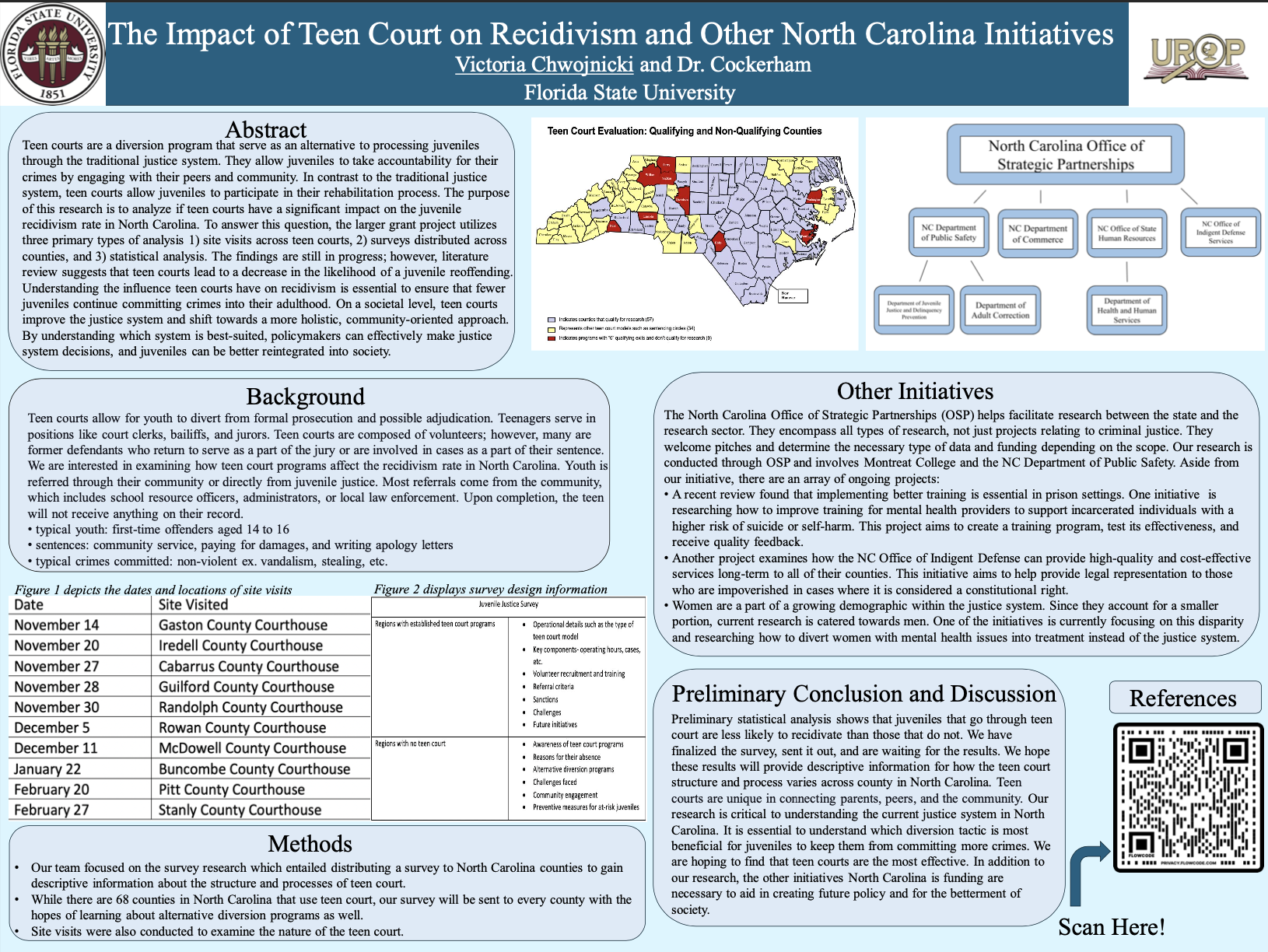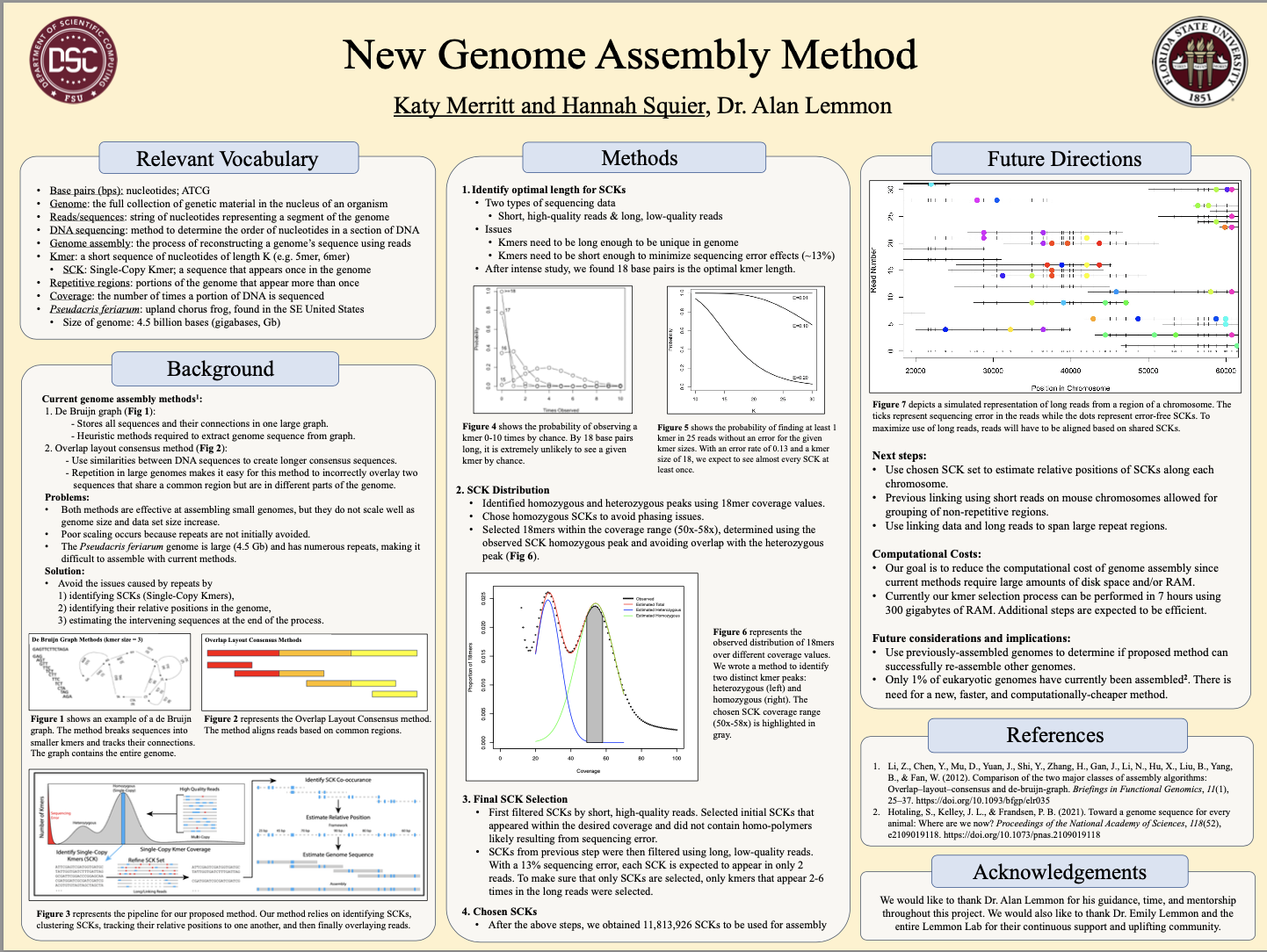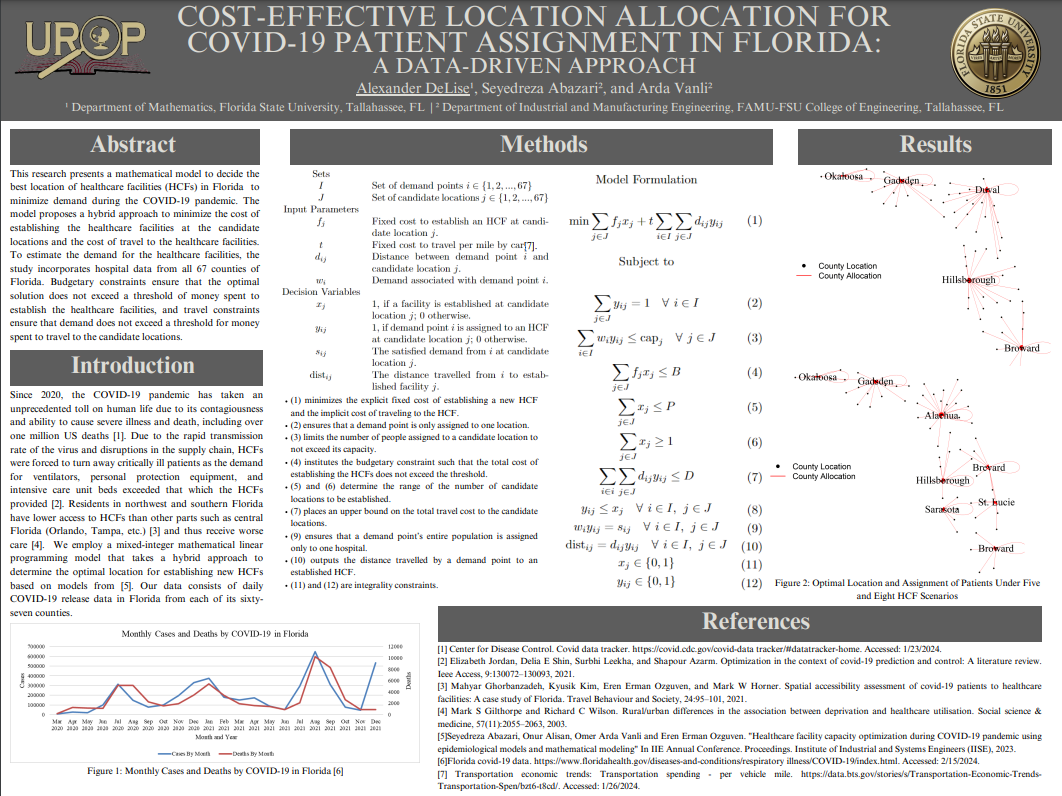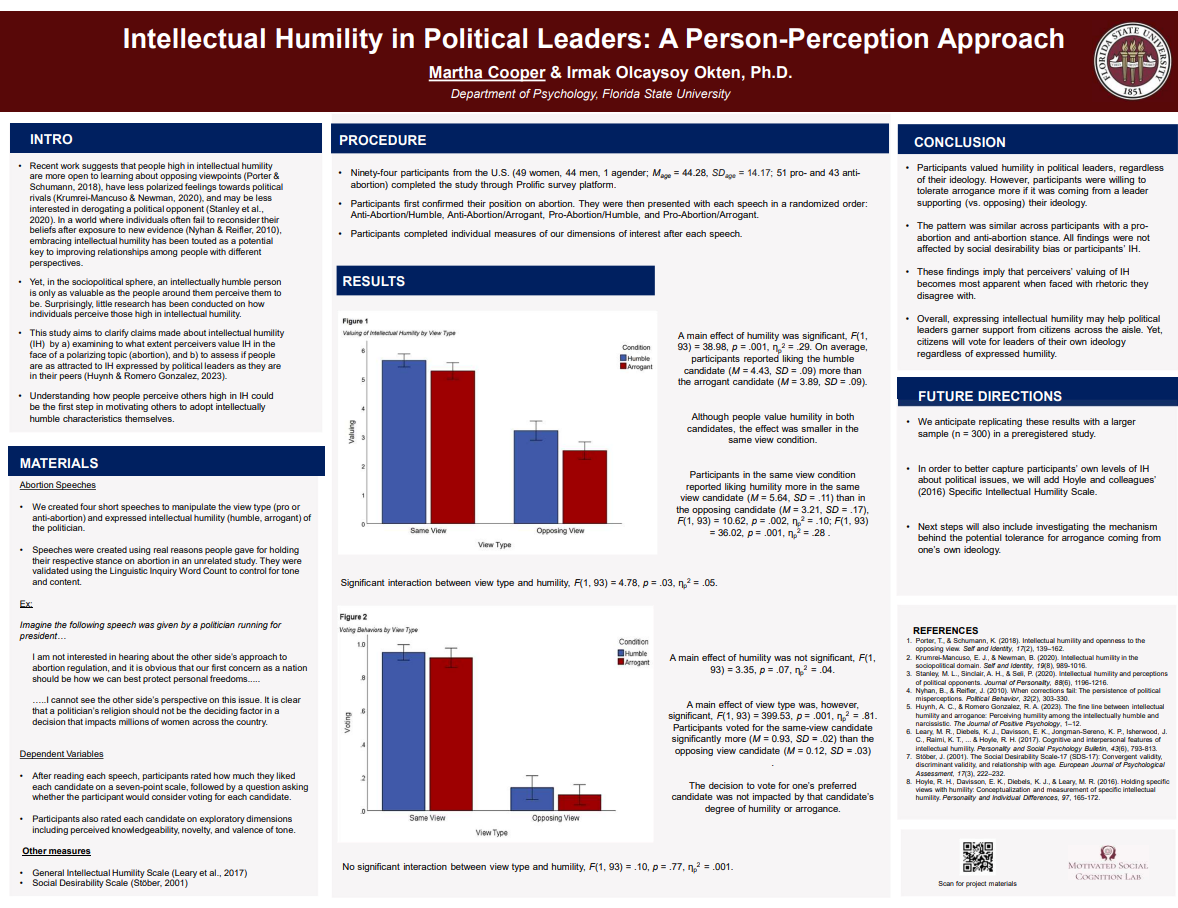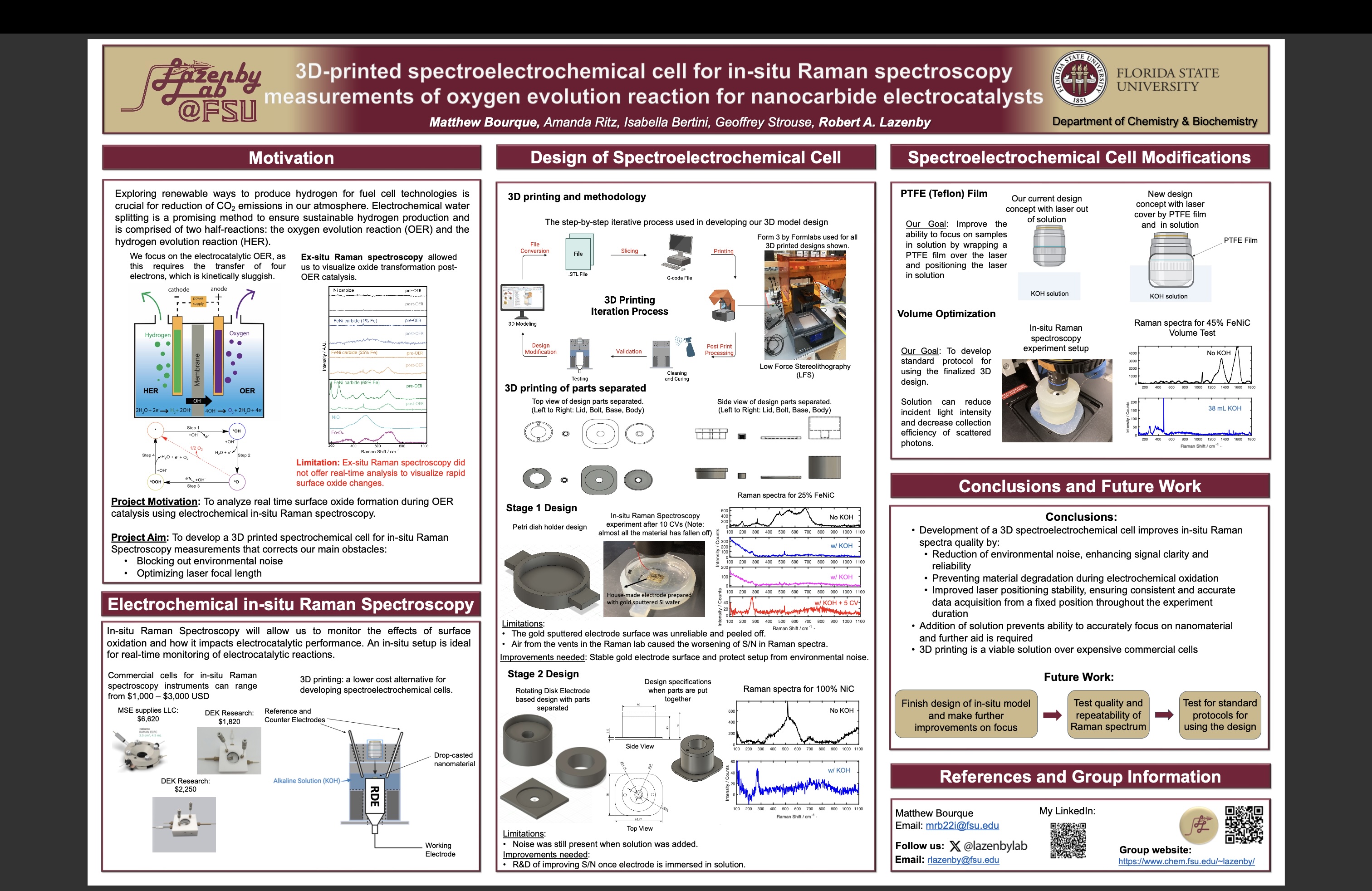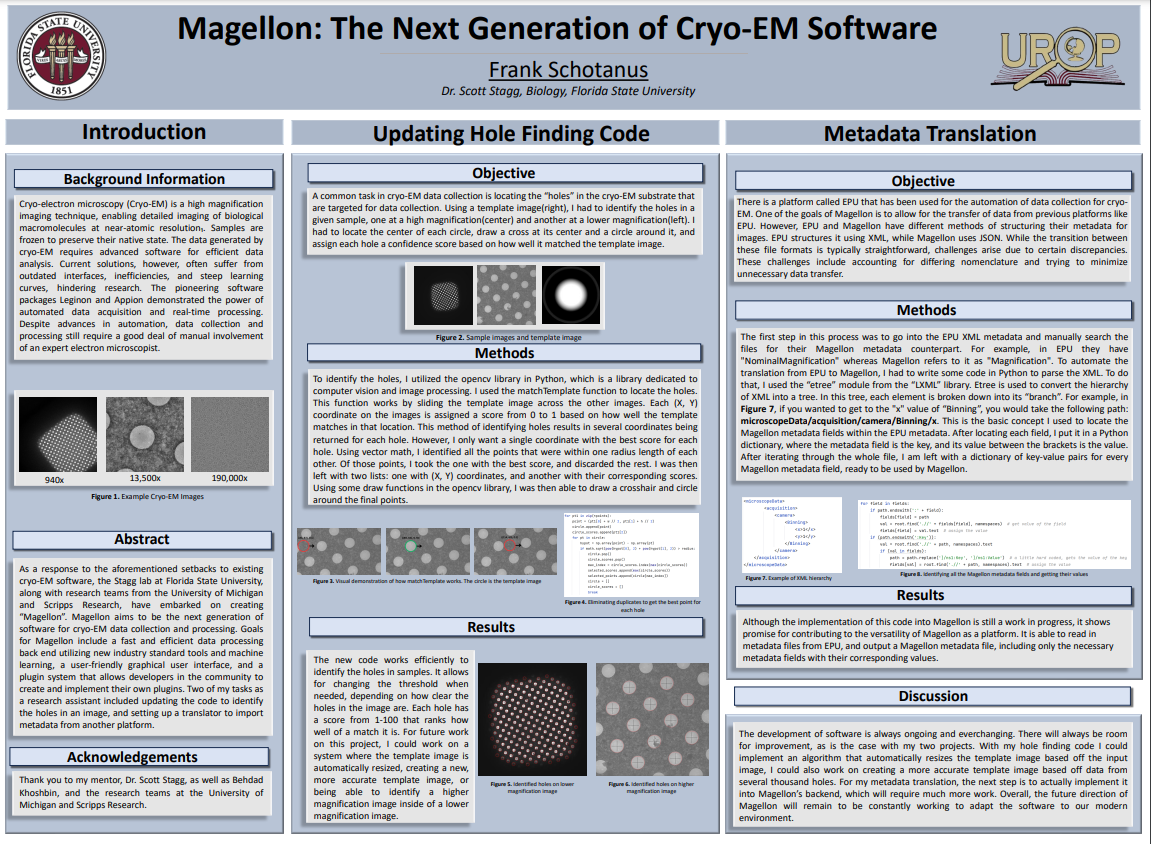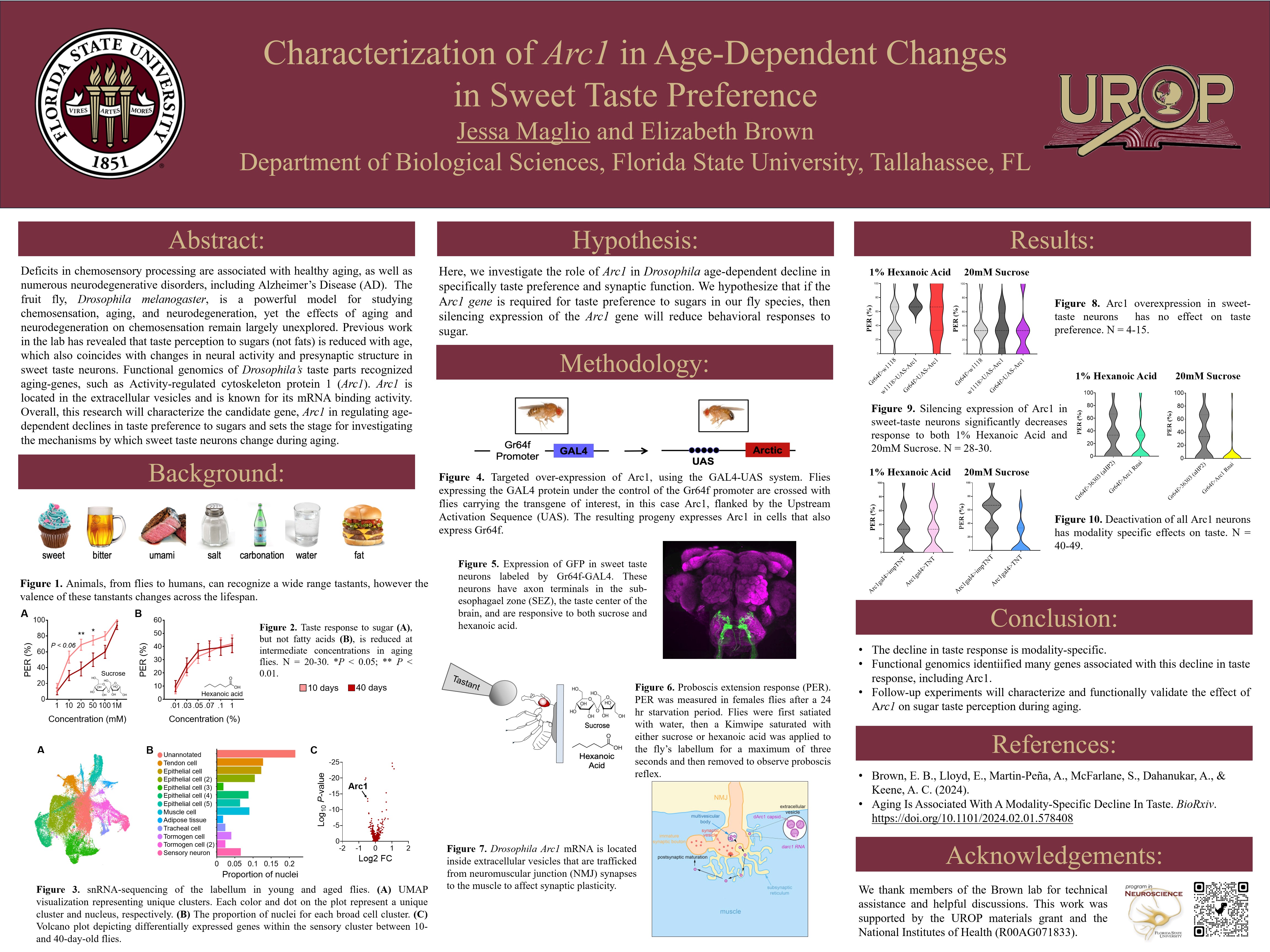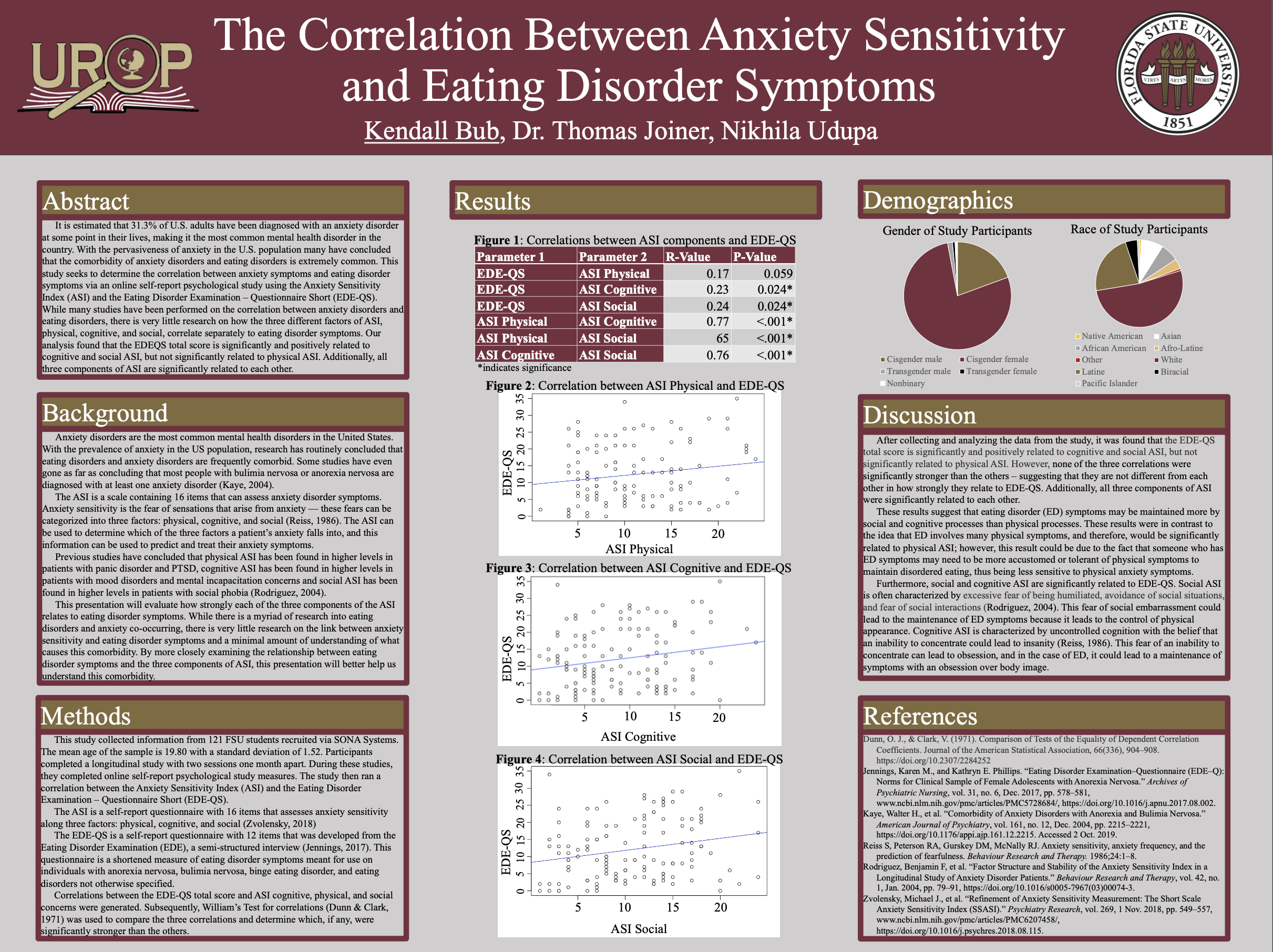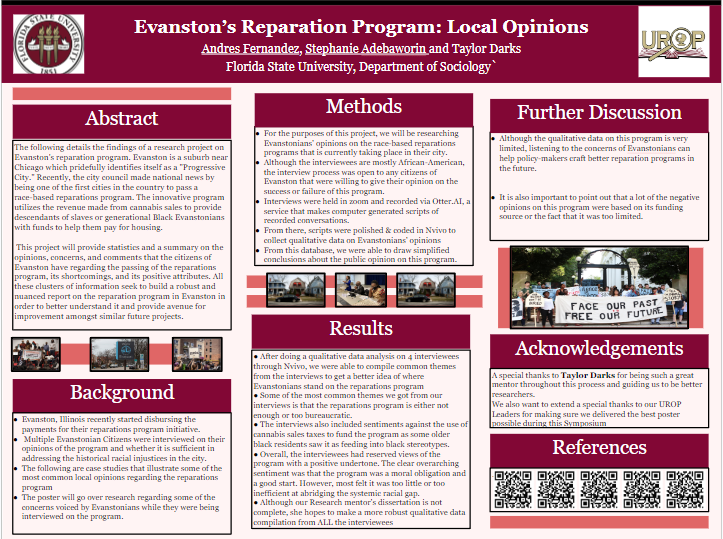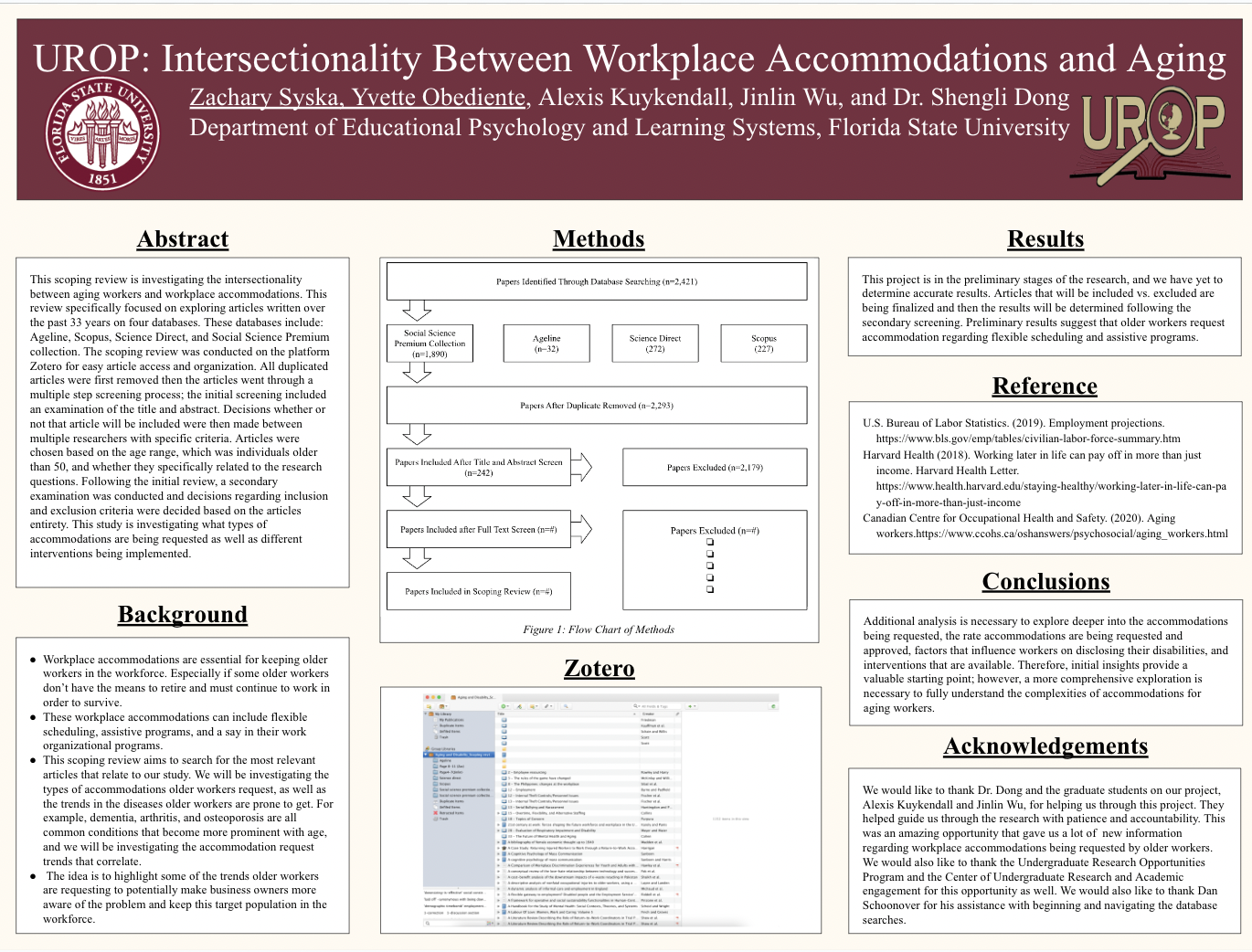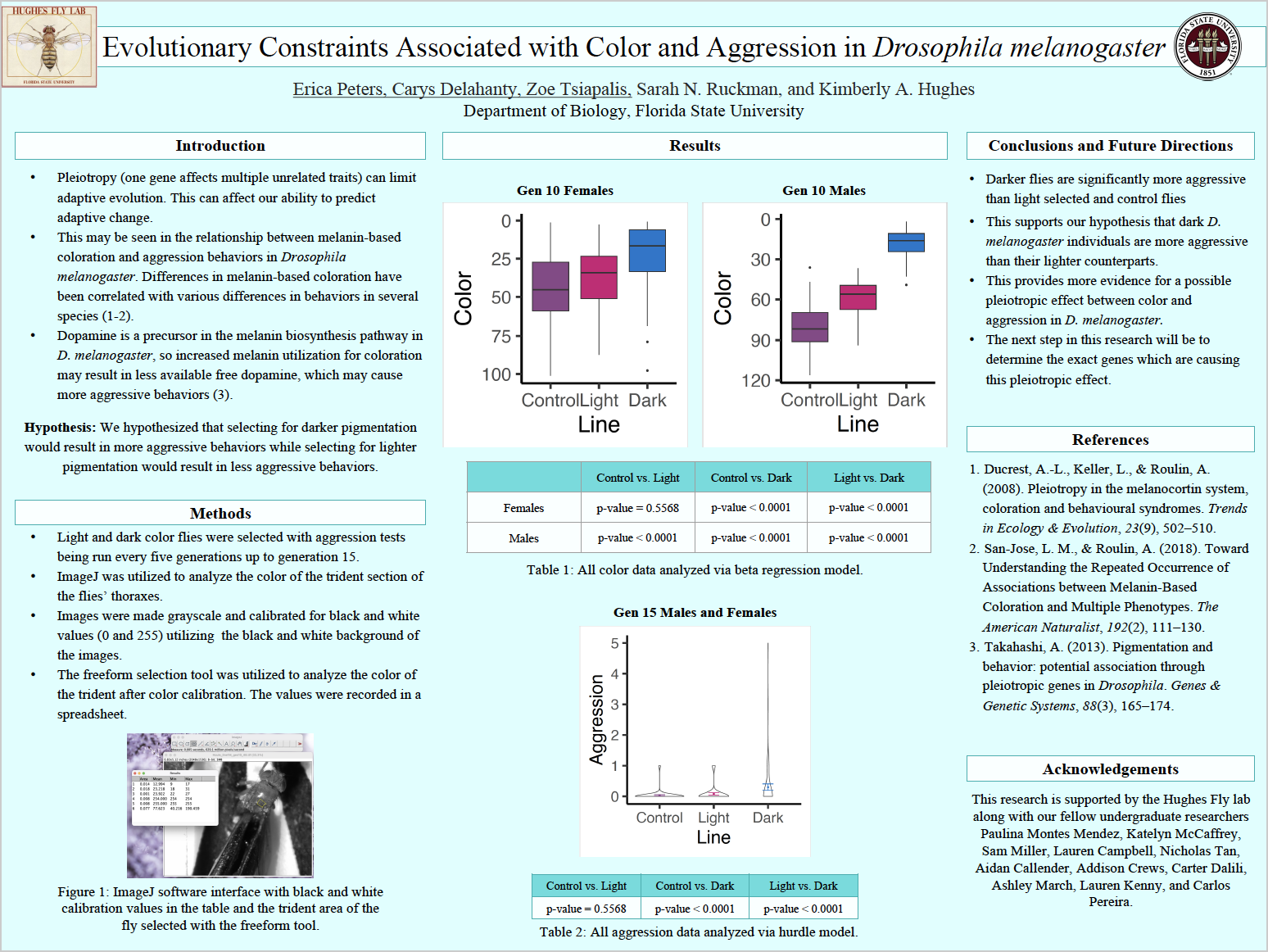Research Symposium
24th annual Undergraduate Research Symposium, April 3, 2024
Kaysyn Jones Poster Session 1: 9:30 am - 10:30 am /391
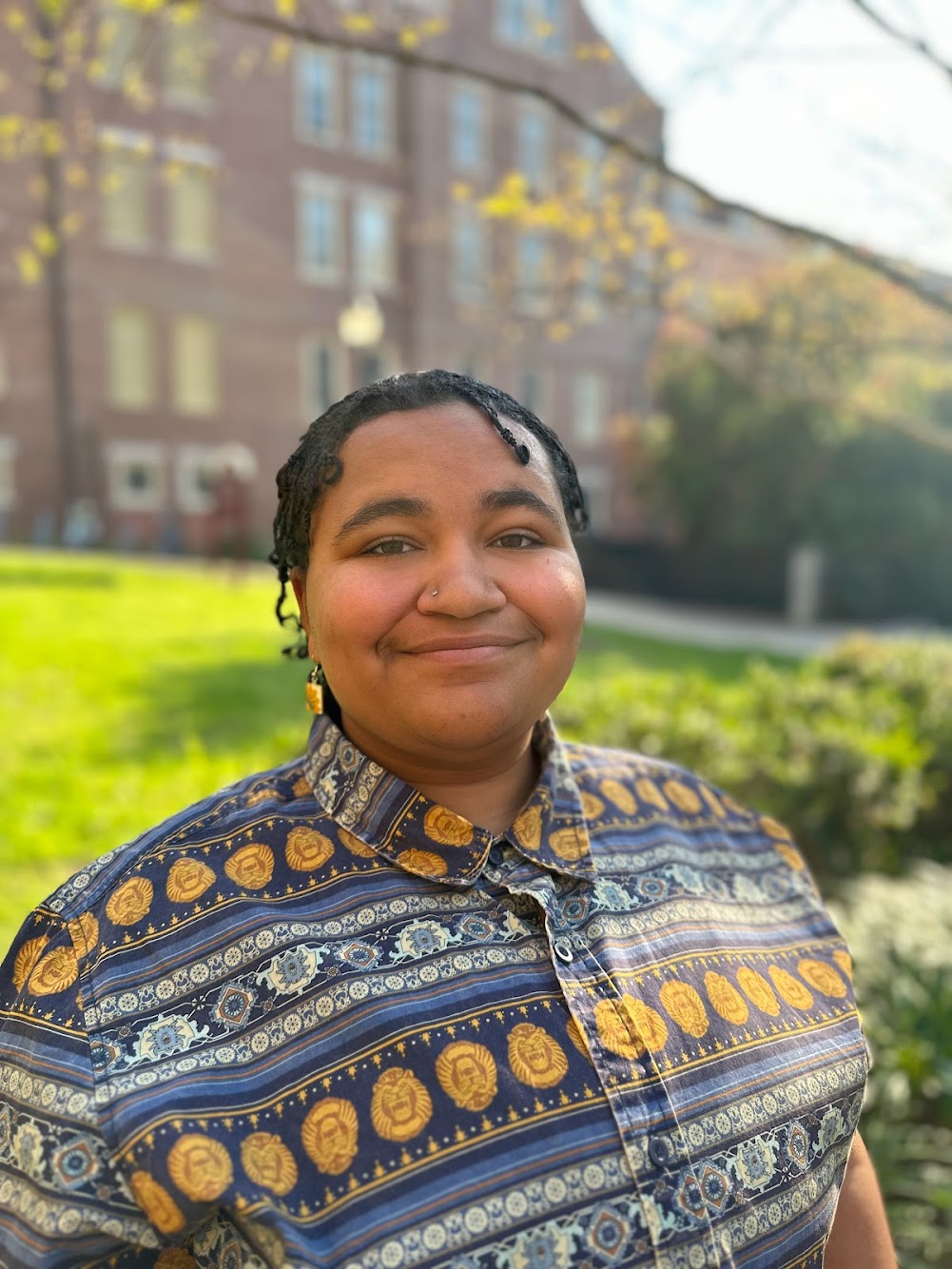
BIO
Kaysyn Jones is a second-year student pursuing dual degrees in English and African American Studies with a minor in Museum Studies. She has a strong interest in African American history and its intersections with literary movements at the turn of the 20th century. She deeply enjoys research, reading, and art, and hopes to pursue an M.A. in History after completely her undergraduate degrees.
Moscow in the Harlem Renaissance
Authors: Kaysyn Jones, Madeleine StoutStudent Major: English, African American Studies
Mentor: Madeleine Stout
Mentor's Department: History Mentor's College: College of Arts and Sciences Co-Presenters:
Abstract
Through a detailed analysis of two key African American writers who interacted with the Soviet Union during the Cold War period, this project hopes to identify the potential influence of Soviet interactions on the New Negro movement. Dorothy West and Langston Hughes were two of the notable Black artists and intellectuals prominent in the Harlem Renaissance who were invited to Moscow, Russia, in 1932 in order to film a Soviet-funded movie on racism in the United States.
By a thorough reading of both writers’ work and respective archival letters, I hope to indicate the role that Moscow played in shaping the ways in which Black intellectuals perceived the shifting economic position of Black America in the early 20th century.
Keywords: History, African American, Russia, Art, Literature
24th annual Undergraduate Research Symposium, April 3, 2024
Denise Perez Poster Session 1: 9:30 am - 10:30 am /427
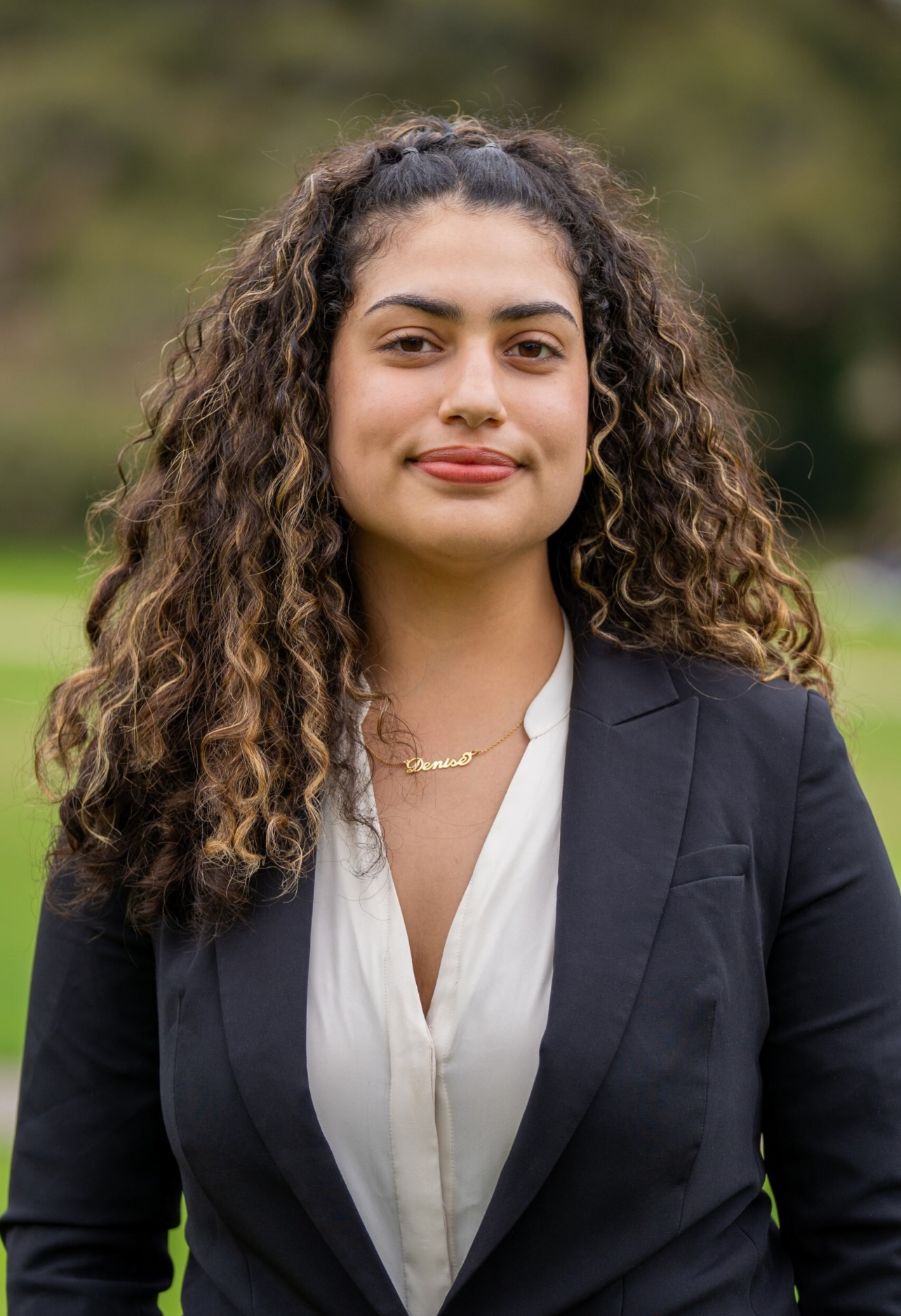
BIO
Denise Perez is a first-generation student from Miami, Florida. Denise's academic journey reflects her passion for legal, economic, and historical knowledge, evident in her pursuit of a dual degree in Psychology and Political Science. Denise's experience in research as an undergraduate research assistant and a mentor in the Undergraduate Research Opportunity Program underscores her commitment to seizing opportunities for personal and professional development. With steadfast dedication to contributing meaningfully to the political science community, she is determined to make a lasting impact on the political science, legal field, and beyond.
Exploring the Nexus between County Government Structure and Fiscal Dynamics
Authors: Denise Perez, Jing PengStudent Major: Political Science, Psychology
Mentor: Jing Peng
Mentor's Department: The Askew School of Public Administration and Policy Mentor's College: Florida State University Co-Presenters:
Abstract
Resource allocation and economic considerations heavily influence the programs and legislative policies that policymakers prioritize. This research analyzes the dynamic relationship between governmental structures and public revenue by examining the relationship between county government form and county-level revenue and expenditures in Florida. Employing regression analysis, this study examines government data gathered through individual county websites and fiscal data collected through centralized databases in Florida, as well as public government financial reports for the 2019 fiscal year. The primary focus is on the key variables that shape county legislature, including the form of government (Traditional Commission, Commission-Administrative, or Commission-Executive), the number of commissioners, the number of districts, and election rules (whether commissioners were elected At-Large or Single Member). Our investigation reveals notable patterns regarding the allocation of funds and the influence of governmental forms on expenditure dynamics. Specifically, counties with a commission-manager government exhibit a trend of lower funding for transportation compared to those with traditional or executive forms. Additionally, an increase in the number of county commissioners correlates with elevated expenditures per capita, particularly in transportation costs and overall revenue. These findings underscore the need for policymakers to consider the implications of different governmental forms on resource allocation and public policy priorities. Ultimately, this research contributes to our understanding of governance strategies and facilitates evidence-based decision making in public administration.
Keywords: Counties, Goverment Expenditures, Local Government, County Government
24th annual Undergraduate Research Symposium, April 3, 2024
Roxie Richbourg Poster Session 2: 10:45 am - 11:45 am/270

BIO
Roxie is a second-year undergraduate student at Florida State University majoring in Political Science, with a minor in Innovation. She is originally from Orlando, Florida, and serves as an undergraduate research assistant for the Collegiate Recovery Program under the mentorship of Dr. Chelsea Shore. In her role as a research assistant, she contributed to creating a descriptive database in support of the ARHE that can be utilized by scholars to push for the development of CRPs nationwide. She has gained valuable knowledge of qualitative and quantitative research methods and the many dimensions of recovery. Her post-graduation plans include earning her Juris Doctorate and pursuing a career in law.
Descriptive Database for the Field of Collegiate Recovery Programs
Authors: Roxie Richbourg, Dr. Chelsea ShoreStudent Major: Political Science
Mentor: Dr. Chelsea Shore
Mentor's Department: Collegiate Recovery Program Research Lab Mentor's College: Association of Recovery in Higher Education Co-Presenters: Zane Reese, Sydney Mock, Vivian Gobler, Daniel Jordana, Anne Marquardt
Abstract
A scoping literature review conducted by N. Vest et al. (2021) revealed a noteworthy deficiency in available evidence pertaining to CRPs. A thorough search conducted up to August 2020 yielded only 54 articles meeting stringent criteria. Addressing this gap and furthering the work of Vest et al., Dr. Shore, supported by the Association of Recovery in Higher Education (ARHE), established an online descriptive database designed to assist college recovery program providers and collegiate administrators. The database has over 100 (N = 122) meticulously analyzed articles related to CRPs and college student recovery from substance (mis)use. Articles are systematically categorized by Author, Journal, Year, Title, Methodology, Analyses, Key Findings, SJDEI Topics, Theories, and Integrated Behavioral Health Areas, ensuring its utility as a comprehensive and structured resource for advancing research. The database aims to guide practitioners in the field of collegiate recovery, facilitating the development and improvement of CRPs within higher education institutions (HEIs).
Keywords: collegiate recovery program, literature review, descriptive database
24th annual Undergraduate Research Symposium, April 3, 2024
Alexander Pommells Poster Session 4: 2:45 pm - 3:45 pm /376

BIO
Alexander is a UROP student in their final semester at FSU, majoring in political science and minoring in philosophy. His political interest are in the areas of economic and conflict analysis. After graduating, he will be attending law school in St. Louis in Missouri hoping to do criminal law upon graduating.
Theory and Hypothesis With Panel Data
Authors: Alexander Pommells, Damian BoldtStudent Major: Political Science
Mentor: Damian Boldt
Mentor's Department: Political Science Mentor's College: College of Social Sciences and Public Policy Co-Presenters:
Abstract
In political science research, researchers are generally concerned with using counterfactuals to determine the effect of a treatment variable. Counterfactuals are relatively easy to understand when data are only measured at one time period. However, in panel data (where multiple units are measured across a given length of time) formulating counterfactuals is much more complicated, because there is a lot more data involved. This added complexity means that there often is a lack of transparency of the difference between the theoretical hypothesis and what the data measures. In this project, we performed a literature review of articles from top international relations journals, hand-coded the kinds of data used for the articles and contrasted that with what would be expected based on the framing of their hypotheses. The goal of this research is to provide context that is important
for interpreting political science research to close the gap between theory and hypothesis.
Keywords: Panel Data, Quantitative,
24th annual Undergraduate Research Symposium, April 3, 2024
Jordan Cheze Poster Session 3: 1:30 pm - 2:30 pm /201
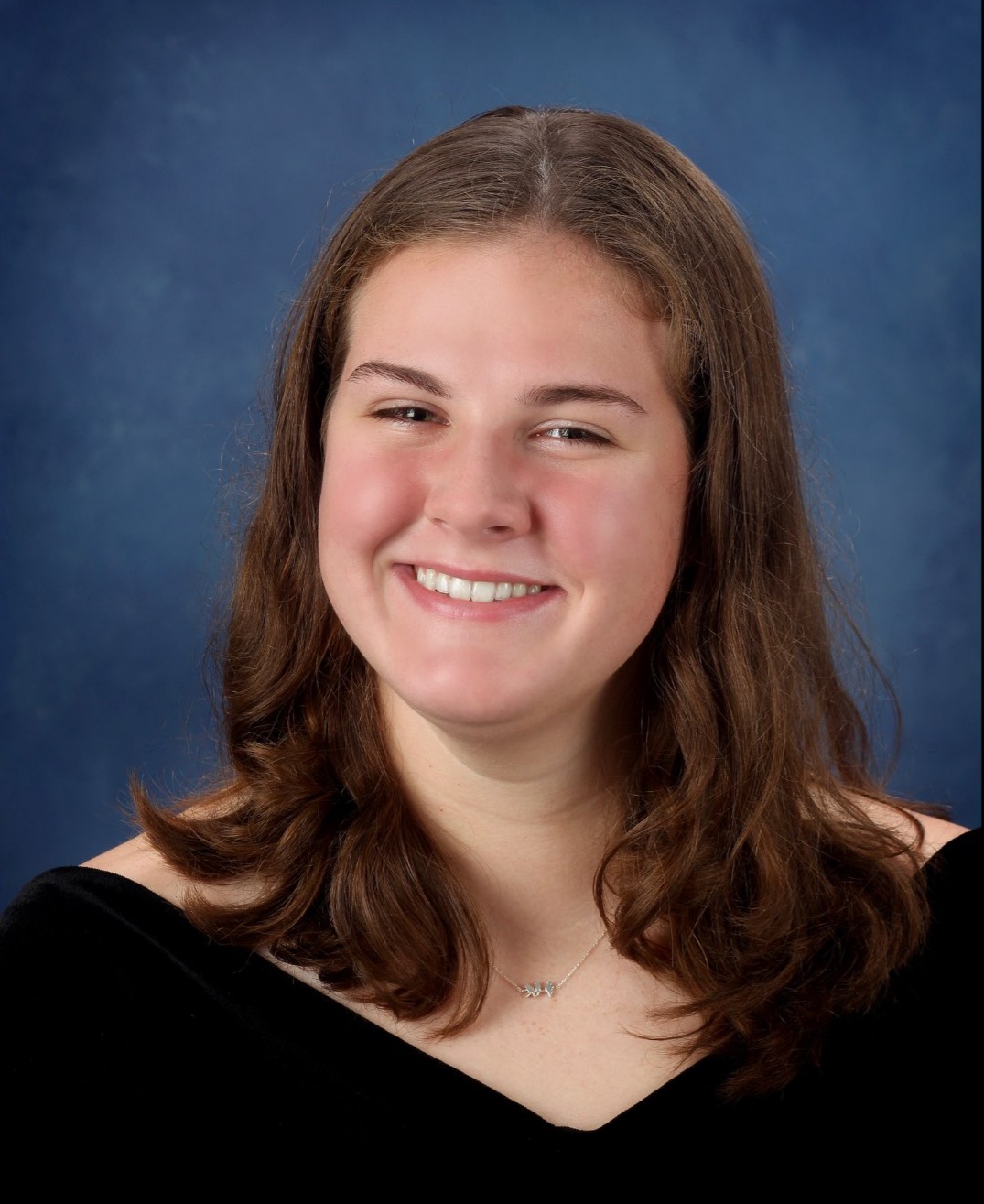
BIO
Jordan Cheze is an undergraduate Meteorology student from Brooksville, Florida. She is involved with the American Meteorological Society and National Weather Association of North Florida and the Students for the Exploration and Development of Space at FAMU-FSU, where she serves as the Project Director. Outside of school, Jordan is an intern with the Bureau of Land Management out of Idaho Falls.
Simulating and Analyzing Wildland Fire Spread
Authors: Jordan Cheze, Bryan QuaifeStudent Major: Meteorology
Mentor: Bryan Quaife
Mentor's Department: Scientific Computing Mentor's College: Arts and Sciences Co-Presenters:
Abstract
Wildland fires are a complex multiphysics problem, integrating elements of meteorology, fluid mechanics, combustion, and ecology. Numerous interconnected factors affect the spread of wildland fires, including atmospheric conditions, fire intensity, fuel structure, and topography. Understanding their dynamics is crucial, not only for comprehending large wildfires but also for informing policies aimed at fire managers who use prescribed fire as a tool to meet different ecological objectives.
This project uses computational tools designed to simulate various types of wildland fire spread. The code accounts for multiple parameters including the background wind speed and direction, the burn time of the fuels, the fire-induced weather, and stochastic turbulence effects.
By systematically adjusting each variable, the computational model determines each parameter’s effect on the rate of spread of the fire. Some of the effects on the rate of spread, such as the wind speed, are linear, while other parameters, such as the fuel burn time, result in a nonlinear relationship. These relationships are summarized and can then be related to their real-world applications.
Keywords: wildland fire, fire behavior
24th annual Undergraduate Research Symposium, April 3, 2024
Julie Pinto Poster Session 5: 4:00 pm - 5:00 pm/359

BIO
My name is Julie T Pinto and I am from Miami, Florida. I am a dedicated biochemistry major interested in understanding living organisms with the ultimate goal of advancing my knowledge in the biochemical field through the lens of sustainability. My research interests have allowed me to expand my knowledge of diverse populations/needs as well as human understanding and my hope is to be able to carry on the things I have learned while conducting research into my educational and occupational careers.
Understanding the Guided Pathways Program in the California Community College System
Authors: Julie Pinto, Dr. Robyn TornayStudent Major: Biochemistry
Mentor: Dr. Robyn Tornay
Mentor's Department: Department of Educational Leadership & Policy Studies Mentor's College: College of Education, Health, and Human Sciences Co-Presenters:
Abstract
Guided Pathways is a program initiated in community colleges around the United States in an effort to restructure the community college experience for students completely. The program serves to offer students a well-rounded education with more available resources and program offerings to ease the process from entry to employment or further education. Specifically, California worked very hard to implement this program and conducted a complete overhaul of its educational procedures. In this project, we attempted to better understand the program, its successes, and its failures from first-hand accounts. We conducted and transcribed interviews with faculty members from a variety of institutions within the California Community College System. Here, they told us about their experiences as their systems changed, the perceived benefits, personal frustrations, and the observed experiences of students both within their college and across the system. We then coded those to form a holistic understanding of these first-hand accounts and apply them to what we know from previous research. We hope to be able to apply our knowledge in improving the system and creating reform to better the student experience.
Keywords: Guided Pathways Program, Community Colleges, Education.
24th annual Undergraduate Research Symposium, April 3, 2024
Estee Davidson Poster Session 5: 4:00 pm - 5:00 pm/83
BIO
My name is Estee Davidson, and I am a sophomore studying Interdisciplinary Medical Sciences with a Clinical Professions focus. My interests include immunology and infectious diseases, and my plan is to attend medical school after finishing my undergraduate education. Through UROP, I have been conducting research under Ph.D. candidate Jeonghwa Yang, and hope to continue participating in research after the conclusion of this project. My membership in both the Undergraduate Research Opportunity Program and the FSU Honors Program has allowed me to gain valuable experience in public health and policy research with the support of my honors coursework. I am also involved on campus in clubs such as Make Medicine Human and FSU Circle K International, and my hobbies include reading, pottery, tennis, and running.
Framing COVID-19 Vaccine Hesitancy
Authors: Estee Davidson, Jeonghwa YangStudent Major: Clinical Professions
Mentor: Jeonghwa Yang
Mentor's Department: Public Administration Mentor's College: Askew School of Public Administration Co-Presenters:
Abstract
COVID-19 is a respiratory sickness caused by the SARS-CoV-2 virus. In 2020, the virus grew into a pandemic, and a vaccine for the virus first became available in December 2020. However, with the vaccine came a notable rise in vaccine hesitancy and anti-vaccine sentiments that limited the uptake of the vaccine in many groups. At its peak, COVID-19 vaccine hesitancy was prevalent in certain areas and demographics, and several factors were identified as contributors to the lack of vaccine uptake. By looking at how academia and mass media framed the COVID-19 vaccine, and by comparing the outside perspective of “defined” social equity with the reality for the individuals experiencing vaccine hesitancy, we hope to determine how public media influenced vaccine uptake and perspectives of the vaccine on the individual level. To accurately analyze mass media and sources that may have influenced public perspective on the vaccine and those experiencing hesitancy, archival sources from CNN, FOX, The New York times, and NPR during the year of 2020 were analyzed. Collected data focused on specific groups who had lower vaccine uptake, vaccine hesitancy, and the general “above” perspective on the “below” population. The collected data provided several causes behind vaccine hesitancy in the United States, including misinformation, lack of vaccine education and availability, varying social capital in different areas, and individual experiences. Further analyses continue, however, these findings suggest that improved vaccine education techniques and accessibility, as well as increased outreach and representation, may help decrease future vaccine hesitancy.
Keywords: COVID-19, mass media, vaccine hesitancy, framing, social equity
24th annual Undergraduate Research Symposium, April 3, 2024
Mehul Adwani Poster Session 4: 2:45 pm - 3:45 pm /232

BIO
I am sophomore at Florida State University majoring in Finance and Economics with a minor in Computer Science. Currently researching under professor Doug Norton, we are leading a study on manual tax withholding within the gig economy, focusing on Uber's market entry. Through meticulous analysis, we aim to inform critical policy discussions on taxation and voting behavior. Passionate about education, I hope to bring diverse skills and interests to the table.
The Impact of Manual Tax Withholding on Attitudes Toward Taxation and Voting Behavior in the Gig Economy: Uber's Market Entry
Authors: Mehul Adwani, Doug NortonStudent Major: Finance, Economics
Mentor: Doug Norton
Mentor's Department: Economics Mentor's College: College of Social Sciences and Public Policy Co-Presenters:
Abstract
This study investigates how manual tax withholding affects attitudes toward taxation and voting behavior, focusing on the gig economy and Uber's entry into new markets. While automatic withholding simplifies tax procedures, concerns exist about its role in obscuring the true cost of taxation and potentially expanding government. The research question explores how exposure to manual withholding, experienced by gig economy workers, particularly Uber contractors, influences attitudes and voting behavior.
Using IRS data on independent contractors, Google Trends data on tax-related searches, and voter turnout data from regions affected by Uber's entry, the study employs statistical analysis and econometric models to discern causal relationships. Integrating datasets allows for a comprehensive understanding of how manual withholding impacts tax compliance, perceptions of taxation, and voting habits.
Anticipated outcomes include insights into the nexus between manual withholding, tax attitudes, and voting patterns, with implications for tax policy formulation and understanding societal effects of gig economy dynamics. By bridging tax practices with public perception, this research contributes to informed policymaking and academic discourse.
Keywords: Economics, 1099 workers, Voting
24th annual Undergraduate Research Symposium, April 3, 2024
Samyuktha Sridhar Poster Session 2: 10:45 am - 11:45 am/128
BIO
Samyuktha Sridhar is a first-year student at Florida State University in the Honors Program pursuing a degree in political science. With experience working as a Teen Attorney for the Teen Court Program in Duval County, she decided to pursue the role of research assistant on a project that assessed the program's effectiveness. With a passion for both law and public policy, Samyuktha plans to practice constitutional law in the future.
Assessing the Impact of North Carolina Teen Court on Recidivism
Authors: Samyuktha Sridhar, Dr. Alexandra CockerhamStudent Major: Political Science
Mentor: Dr. Alexandra Cockerham
Mentor's Department: Interdisciplinary Social Sciences Mentor's College: College of Social Sciences and Public Policy Co-Presenters:
Abstract
Teen courts are a type of diversionary program used in lieu of the standard legal system when dealing with juveniles. Teen courts are primarily intended for first-time or low-level offenders and serve to interrupt any developing patterns of criminal behavior. Teen courts use informal processing and sanctions in place of standard procedure to deter future offenses. This program is aimed to provide juveniles with the opportunity to reform by connecting them more specifically with their crime. The sanctions received not only punish the juvenile for the crime, but they also encourage them to restore the damages their crime has caused to the community. The purpose of this research is to assess the impact of North Carolina Teen Court on recidivism by comparing juveniles who successfully completed the Teen Court program with those that were diverted to some other program. The second comparison is conducted between juveniles who successfully completed Teen Court with those that received no diversion plan and went through the traditional court system. With the effects of these comparisons combined, a thorough assessment of the effectiveness of Teen Court compared to other diversionary options will be made. As conclusions are drawn from the data acquired from both quantitative and qualitative analyses, an understanding of the juvenile justice system can be solidified and used to improve the system based on how it affects juvenile delinquents.
Keywords: Honors, University, Samyuktha
24th annual Undergraduate Research Symposium, April 3, 2024
Victoria Chwojnicki Poster Session 3: 1:30 pm - 2:30 pm /411

BIO
Hi! My name is Victoria Chwojnicki, and I am from a Chicago suburb in Illinois. I am a sophomore majoring in Economics with a minor in business. This year, I have gained a lot of insight while researching the impact teen court has on the recidivism rate in North Carolina.
The Impact of Teen Court on Recidivism and Other North Carolina Initiatives
Authors: Victoria Chwojnicki, Dr. CockerhamStudent Major: Economics
Mentor: Dr. Cockerham
Mentor's Department: Department of Political Science Mentor's College: College of Social Sciences and Public Policy Co-Presenters:
Abstract
Teen courts are a diversion program that serve as an alternative to processing juveniles through the traditional justice system. They allow juveniles to take accountability for their crimes by engaging with their peers and community. In contrast to the traditional justice system, teen courts allow juveniles to participate in their rehabilitation process. The purpose of this research is to analyze if teen courts have a significant impact on the juvenile recidivism rate in North Carolina. To answer this question, the larger grant project utilizes three primary types of analysis 1) site visits across teen courts, 2) surveys distributed across counties, and 3) statistical analysis. The findings are still in progress; however, literature review suggests that teen courts lead to a decrease in the likelihood of a juvenile reoffending. Understanding the influence teen courts have on recidivism is essential to ensure that fewer juveniles continue committing crimes into their adulthood. On a societal level, teen courts improve the justice system and shift towards a more holistic, community-oriented approach. By understanding which system is best-suited, policymakers can effectively make justice system decisions, and juveniles can be better reintegrated into society.
Keywords: Recidivism, Juvenile Justice, Criminal Justice
24th annual Undergraduate Research Symposium, April 3, 2024
Hannah Squier Poster Session 1: 9:30 am - 10:30 am /127
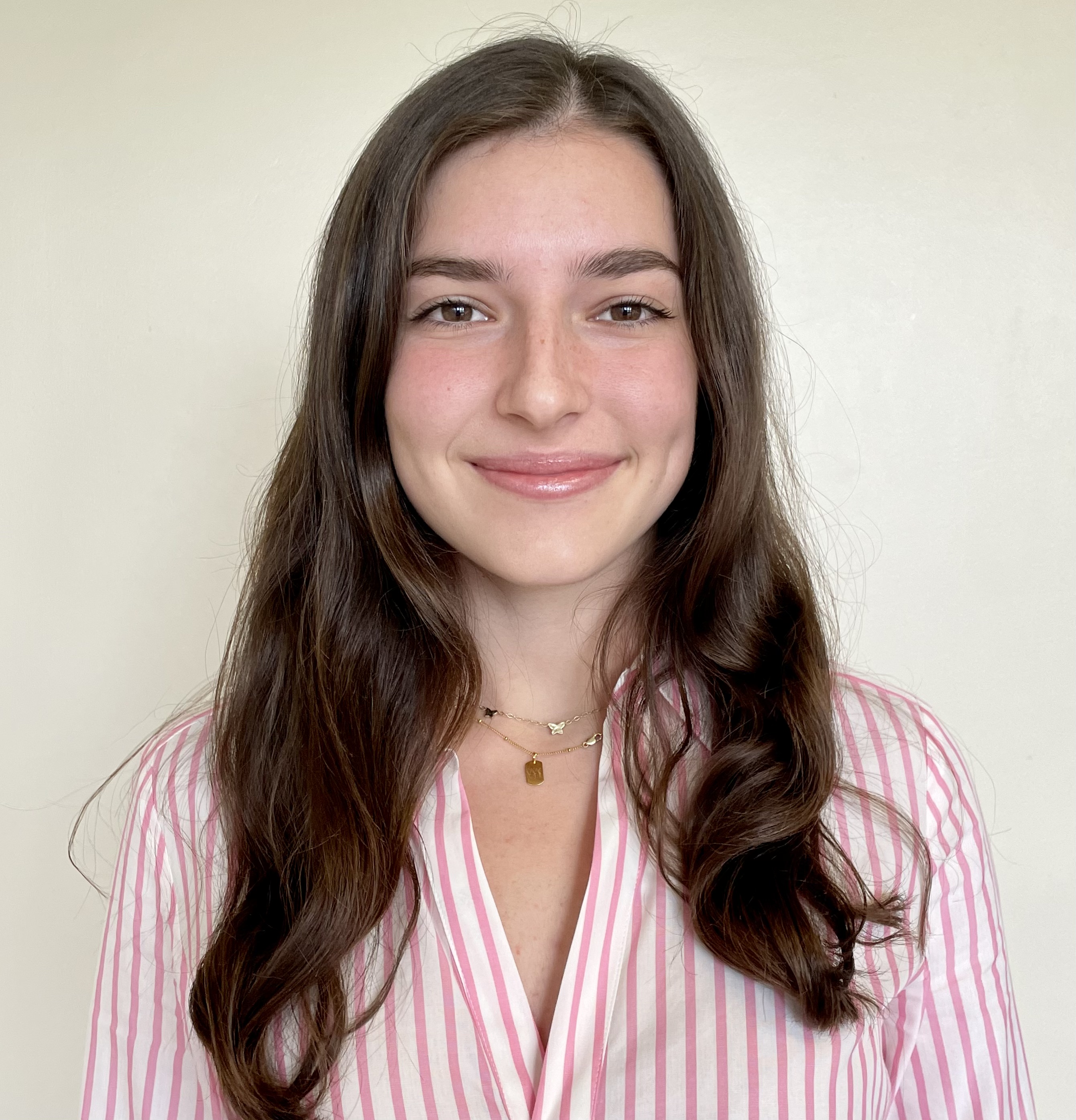
BIO
Hannah is a second-year Biological Sciences and Economics double major at Florida State University, and she currently works as a research assistant in the Lemmon Lab. Under the direct mentorship of Dr. Alan Lemmon, her collaborative projects include studying neuroreceptor evolution in Pseudacris feriarum and developing a new method for large genome assembly. Outside of her research, Hannah is a Presidential Scholar and member of the Honors Program and the Torch Society.
New Genome Assembly Method
Authors: Hannah Squier, Dr. Alan LemmonStudent Major: Biological Science and Economics
Mentor: Dr. Alan Lemmon
Mentor's Department: Scientific Computing Mentor's College: College of Arts and Sciences Co-Presenters: Katy Merritt
Abstract
Current methods of genome assembly do not differentiate between the various regions of a genome (i.e., satellite regions, multi-copy regions, gene-rich regions, etc.). Instead, all regions are treated as equally helpful and informative. While this approach is sufficient for smaller genomes, assemblies for larger genomes face complications as it is difficult to distinguish the highly repetitive regions of the genome from one another. Our approach focuses on using single-copy regions of the genome as anchor points, which allows for relative position information to be obtained and the other regions of the genome to be overlaid onto the single-copy regions towards the end of the assembly.
Keywords: Genetics, Genome Assembly, Computation, Kmers
24th annual Undergraduate Research Symposium, April 3, 2024
Alexander DeLise Poster Session 5: 4:00 pm - 5:00 pm/137
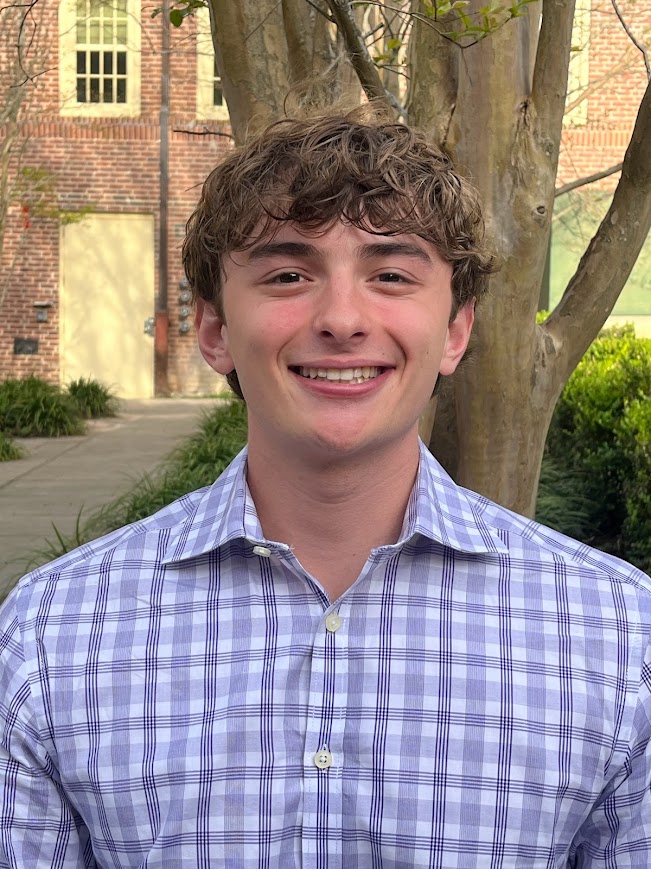
BIO
I am a first-year student pursuing research in Operations Research and Industrial Engineering. In Summer 2024, I will begin new research through the Quantum Algorithms and Optimization Research Experience for Undergraduates at the University of Tennessee Knoxville. At FSU I am a Presidential Scholar and I am involved in the Pi Mu Epsilon mathematics fraternity and honor society, the Society of Undergraduate Math Students, and Cub Pickleball. I am from Tampa, Florida.
Cost-Effective Location Allocation for COVID-19 Patient Assignment in Florida: A Data-Driven Approach
Authors: Alexander DeLise, Seyedreza AbazariStudent Major: Applied and Computational Mathematics, Computational Science
Mentor: Seyedreza Abazari
Mentor's Department: Department of Industrial and Manufacturing Engineering Mentor's College: FAMU-FSU College of Engineering Co-Presenters:
Abstract
This research presents a mathematical model to decide the best location for healthcare facilities in Florida to minimize demand during the COVID-19 pandemic. The model proposes a hybrid approach to minimize the cost of establishing the healthcare facilities at the candidate locations and the cost of travel to the healthcare facilities. To estimate the demand for healthcare facilities, the study incorporates hospital data from all 67 counties of Florida. Budgetary constraints ensure that the optimal solution does not exceed a threshold of money spent to establish the healthcare facilities, and travel constraints ensure that demand does not exceed a threshold for money spent to travel to the candidate locations.
Keywords: COVID-19, Healthcare Facilities, Location Allocation, Optimization, Florida
24th annual Undergraduate Research Symposium, April 3, 2024
Martha Cooper Poster Session 1: 9:30 am - 10:30 am /97
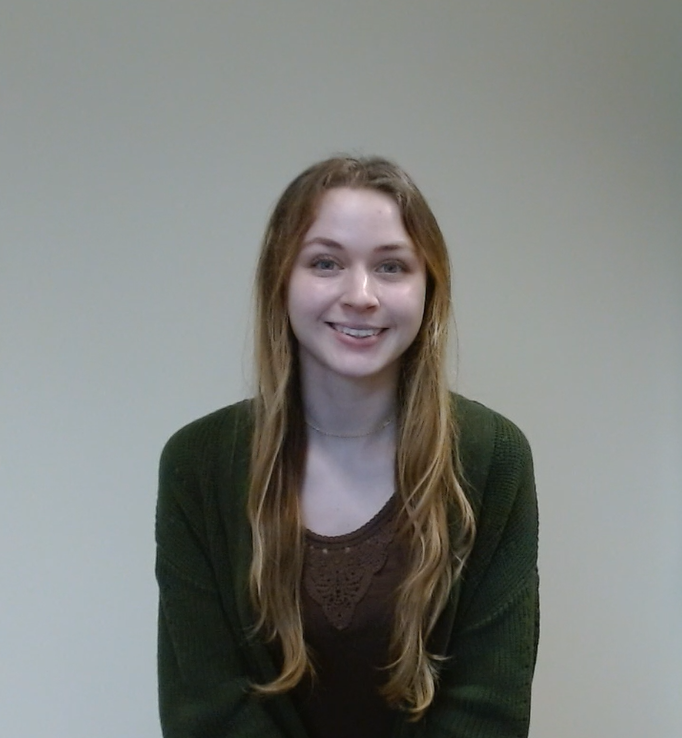
BIO
Martha is from Anchorage, Alaska and plans on continuing person-perception research in graduate school.
Intellectual Humility in Political Leaders: A Person-Perception Approach
Authors: Martha Cooper, Dr. Irmak Olcaysoy OktenStudent Major: Psychology, Philosophy
Mentor: Dr. Irmak Olcaysoy Okten
Mentor's Department: Psychology Mentor's College: Arts and Sciences Co-Presenters:
Abstract
Recent work suggests that people high in intellectual humility are more open to learning about opposing viewpoints (Porter & Schumann, 2018), have less polarized feelings towards political rivals (Krumrei-Mancuso & Newman, 2020), and may be less interested in derogating a political opponent (Stanley et al., 2020). In a world where individuals often fail to reconsider their beliefs after exposure to new evidence (Nyhan & Reifler, 2010), embracing intellectual humility has been touted as a potential key to improving relationships among people with different perspectives. Yet, in the sociopolitical sphere, an intellectually humble person is only as valuable as the people around them perceive them to be. Surprisingly, little research has been conducted on how individuals perceive those high in intellectual humility. This study aims to clarify claims made about intellectual humility (IH) by a) examining to what extent perceivers value IH in the face of a polarizing topic (abortion), and b) to assess if people are as attracted to IH expressed by political leaders as they are in their peers (Huynh & Romero Gonzalez, 2023).
Understanding how people perceive others high in IH could be the first step in motivating others to adopt intellectually humble characteristics themselves.
Keywords: psychology, humility, political leaders
24th annual Undergraduate Research Symposium, April 3, 2024
Matthew Bourque Poster Session 1: 9:30 am - 10:30 am /61

BIO
My name is Matthew Bourque and I am a junior Chemical Engineering student at FSU, originally from Bradenton, Florida. My main interests in research revolve around renewable energy and sustainability, particularly in hydrogen production for fuel cell technology. I intend to further my education in graduate school, driven by a major interest in space exploration.
3D-printed spectroelectrochemical cell for in-situ Raman spectroscopy measurements of oxygen evolution reaction for nanocarbide electrocatalysts
Authors: Matthew Bourque, Robert LazenbyStudent Major: Chemical Engineering
Mentor: Robert Lazenby
Mentor's Department: Department of Chemistry and Biochemistry Mentor's College: University of Warwick Co-Presenters:
Abstract
Exploring renewable ways to produce hydrogen for fuel cell technologies is crucial for reduction of CO2 emissions in our atmosphere. Electrochemical water splitting is a promising method to ensure sustainable hydrogen production, and is comprised of two half-reactions: the oxygen evolution reaction (OER) and the hydrogen evolution reaction (HER). We focus on the electrocatalytic OER, as this requires the transfer of four electrons, which is kinetically sluggish. One of the limitations for implementing electrochemical water splitting at a large scale is the high cost of current state-of-the-art electrocatalysts such as RuO2 and IrO2. Transition metal carbides have emerged as a potential candidate for efficient OER electrocatalysts, however the impact of surface oxidation when exposed to harsh water-electrolyzer conditions requires further exploration. In-situ Raman Spectroscopy will allow us to monitor the effects of surface oxidation and how it impacts electrocatalytic performance. An in-situ setup is ideal for real-time monitoring of electrocatalytic reactions. However, the limitations of in-situ Raman spectroscopy include the high cost and complexity of experimental setup. 3D printing technology is a low-cost and versatile option for designing a spectroelectrochemical cell for monitoring these surface oxidation changes during electrocatalytic OER. The design of an in-situ Raman spectroelectrochemical cell requires optimization of the focal length, minimizing environmental noise, and ensuring device compatibility with the instrument. In this work, we outline the design elements of such a device using 3D printing, that will allow us to monitor real-time surface oxidation changes using in-situ Raman measurements of nanocarbide OER electrocatalysts.
Keywords: electrocatalysis Raman Spectroscopy 3D Printing
24th annual Undergraduate Research Symposium, April 3, 2024
Frank Schotanus Poster Session 4: 2:45 pm - 3:45 pm /310
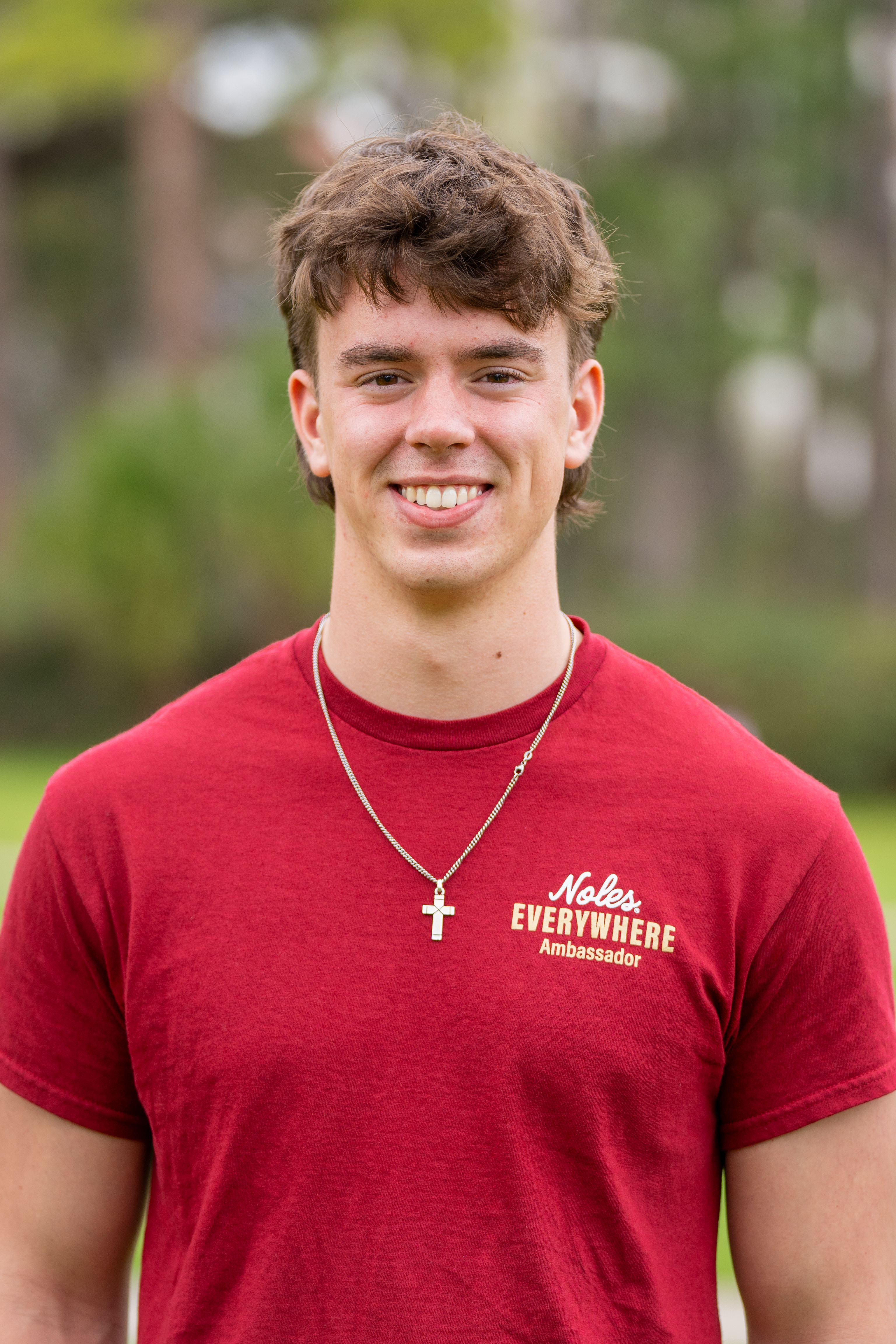
BIO
I am from Chicago, Illinois, majoring in computer science and computational biology. I have academic interests in the fields of software engineering, bioinformatics, and artificial intelligence, and I intend to pursue a graduate degree in one of those fields. Outside of the classroom, I am the president of the Association for Computing Machinery student chapter at FSU, I work as an ambassador for the 'Noles Everywhere program, and I'm on the men's club volleyball team. I enjoy working out, reading, and classical music.
Magellon: The Next Generation of Cryo-EM Software
Authors: Frank Schotanus, Dr. Scott StaggStudent Major: Computer Science and Computational Biology
Mentor: Dr. Scott Stagg
Mentor's Department: Biology Mentor's College: Ph.D., University of Alabama at Birmingham Co-Presenters:
Abstract
A cryo-electron microscope is an advanced imaging tool used in structural biology to visualize biological samples at high resolutions. The microscope uses electron beams to create detailed images of the frozen samples, allowing scientists to study the three-dimensional structures of proteins, viruses, and other biological entities. In order to effectively operate a cryo-electron microscope, the appropriate software needs to be used to store, view, and analyze the data captured by the microscope. Current software exists that accomplish these tasks, but can prove to be outdated, inefficient, and hard to use. Oftentimes, the operator must have extensive command line experience to use the software, which can be a lot to ask of a researcher whose expertise does not lie in that field. That is why we are developing Magellon. Magellon is the next generation of software that aims to fix all the aforementioned setbacks of current software for these microscopes. Magellon hopes to be the software of choice for cryo-electron microscope operators around the world by implementing a fast and efficient back end database, while also maintaining a user-friendly graphical user interface.
Keywords: Cryo-EM, Molecular Biology, Computational Biology, Software Development
24th annual Undergraduate Research Symposium, April 3, 2024
Jessa Maglio Poster Session 5: 4:00 pm - 5:00 pm/29
BIO
My name is Jessa Maglio. I am a second-year student from Naples, Florida majoring in Biology. Science and Healthcare has always been my passion as these fields nurture and cultivate my analytical nature and desire to help people. Currently, I am working as a research assistant on a program funded by the NIH at Florida State University. My research is focused on healthy aging and numerous neurodegenerative disorders, including Alzheimer’s Disease. I am driven by gaining a greater understanding of the key health challenges facing our communities and working toward their solutions.
Characterization of Arc1 in Age-Dependent Changes in Sweet Taste Preference
Authors: Jessa Maglio, Dr. Elizabeth BrownStudent Major: Biological Science
Mentor: Dr. Elizabeth Brown
Mentor's Department: Department of Biological Science Mentor's College: College of Arts and Sciences Co-Presenters:
Abstract
Deficits in chemosensory processing are associated with healthy aging, as well as numerous neurodegenerative disorders, including Alzheimer’s Disease (AD). Understanding the mechanisms that regulate these changes may provide insight into the fundamental dysfunction associated with aging and neurodegeneration. The fruit fly, Drosophila melanogaster, is a powerful model for studying chemosensation, aging, and neurodegeneration, yet the effects of aging and neurodegeneration on chemosensation remain largely unexplored. Previous work in the lab has revealed that taste perception to sugars (not fats) is reduced with age, which also coincides with changes in neural activity and presynaptic structure in sweet taste neurons. Functional genomics of Drosophila’s taste parts recognized aging-genes, such as Activity-regulated cytoskeleton protein 1 (Arc1). Arc1 is located in the extracellular vesicles and is known for its mRNA binding activity. Here, we investigate the role of Arc1 in Drosophila age-dependent decline in specifically taste preference and synaptic function. We will first manipulate expression of Arc1 in Drosophila sweet-taste neurons and then measure taste preference to different appetitive tastants. We hypothesize that if Arc1 is required for taste preference to sugars, then silencing expression of Arc1 will reduce behavioral responses to sugar. Overall, this research will characterize the candidate gene, Arc1 in regulating age-dependent declines in taste preference to sugars and sets the stage for investigating the mechanisms by which sweet taste neurons change during aging.
Keywords: Chemosensation, Aging, Neurodegeneration, Biology
24th annual Undergraduate Research Symposium, April 3, 2024
Kendall Bub Poster Session 3: 1:30 pm - 2:30 pm /321
BIO
My name is Kendall Bub and I am a first year student originally from Overland Park, Kansas, a suburb of Kansas City. I am pursuing a degree in Interdisciplinary Medical Sciences: Clinical Professions with a minor in Spanish on the Pre-medical track. After completing my undergraduate degree, I plan to attend medical school pursuing an M.D. My research interests include eating disorders, anxiety disorders, mental health in marginalized populations, and women's health.
The Correlation Between Anxiety Sensitivity and Eating Disorder Symptoms
Authors: Kendall Bub, Nikhila UdupaStudent Major: Interdisciplinary Medical Sciences: Clinical Professions
Mentor: Nikhila Udupa
Mentor's Department: Psychology Mentor's College: College of Arts and Sciences Co-Presenters:
Abstract
It is estimated that 31.3% of U.S. adults have been diagnosed with an anxiety disorder at some point in their lives, making it the most common mental health disorder in the country. With the pervasiveness of anxiety in the U.S. population many have concluded that the comorbidity of anxiety disorders and eating disorders is extremely common. This study seeks to determine the correlation between anxiety symptoms and eating disorder symptoms via an online self-report psychological study using the Anxiety Sensitivity Index (ASI) and the Eating Disorder Examination – Questionnaire Short (EDE-QS). While many studies have been performed on the correlation between anxiety disorders and eating disorders, there is very little research on how the three different factors of ASI, physical, cognitive, and social, correlate separately to eating disorder symptoms. Our analysis found that the EDEQS total score is significantly and positively related to cognitive and social ASI, but not significantly related to physical ASI. Additionally, all three components of ASI are significantly related to each other.
Keywords: anxiety, eating disorders, psychology
24th annual Undergraduate Research Symposium, April 3, 2024
Andres Fernandez Poster Session 1: 9:30 am - 10:30 am /313
BIO
Political Science student from South Florida. I was born in Venezuela and have been living in The United States for the past 8 years. After college I plan to go to Law School and study immigration law. In my free time I love to read, play guitar and write.
Evanston’s Reparation Program: Local Opinions
Authors: Andres Fernandez, Taylor DarksStudent Major: Political Science & Economics
Mentor: Taylor Darks
Mentor's Department: Sociology Mentor's College: Florida State University Co-Presenters: Stephanie Adebaworin
Abstract
The following details the findings of a research project on Evanston's reparation program. Evanston is a suburb near Chicago which pridefully identifies itself as a "Progressive City." Recently, the city council made national news by being one of the first cities in the country to pass a race-based reparations program. The innovative program utilizes the revenue made from cannabis sales to provide descendants of slaves or generational Black Evanstonians with funds to help them pay for housing.
This project will provide statistics and a summary on the opinions, concerns, and comments that the citizens of Evanston have regarding the passing of the reparations program, its shortcomings, and its positive attributes. All these clusters of information seek to build a robust and nuanced report on the reparation program in Evanston in order to better understand it and provide avenue for improvement amongst similar future projects.
Keywords: Reparations, Equality, Race, Evanston
24th annual Undergraduate Research Symposium, April 3, 2024
Zachary Syska Poster Session 2: 10:45 am - 11:45 am/110
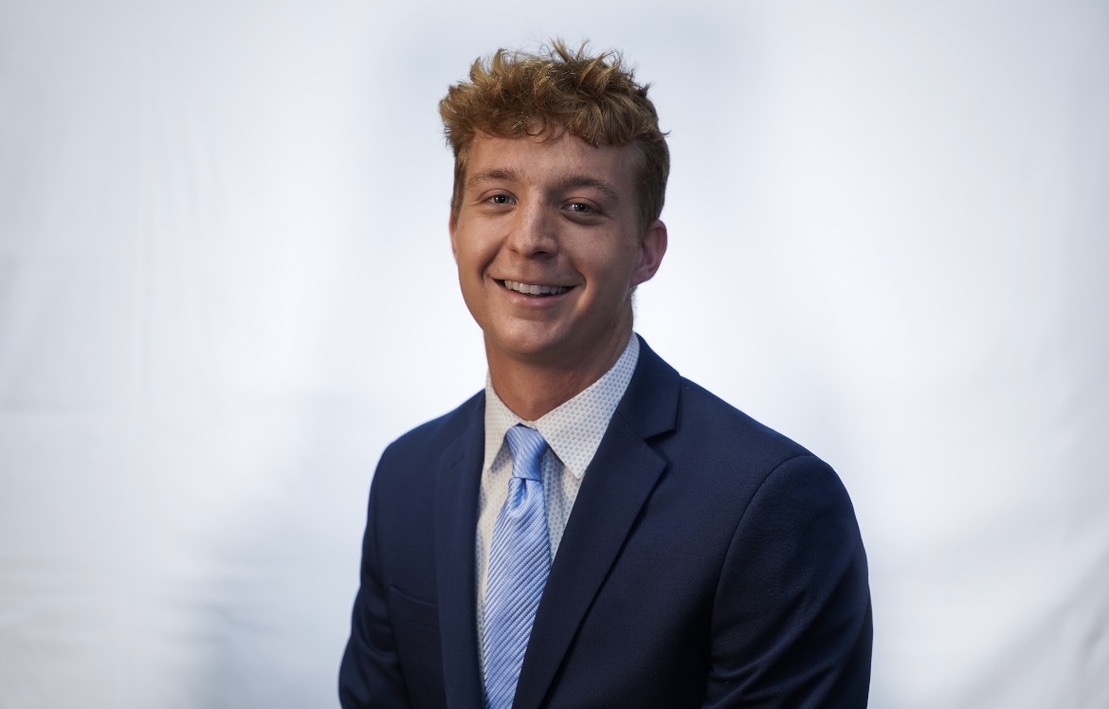
BIO
My name is Zachary Syska, I am a 2nd year studying Health Management, Information and Policy within the Interdisciplinary Medical Science program. I am from Fort Myers, FL and have aspirations of going into a healthcare profession. Specifically, I would like to go to D.O. school and become an emergency medicine physician. I am currently in the Medical Response Unit as a trainee and am involved with Dance Marathon, SGA, and am in a social fraternity: Kappa Sigma. I also work as a part-time chiropractic assistant at an alternative medicine clinic.
Intersectionality Between Workplace Accommodations and Aging
Authors: Zachary Syska, Dr. Shengli DongStudent Major: Interdisciplinary Medical Science: Health Management, Information and Policy
Mentor: Dr. Shengli Dong
Mentor's Department: Educational Psychology and Learning Systems Mentor's College: College of Education, Health, and Human Sciences Co-Presenters: Yvette Obediente
Abstract
This scoping review is investigating the intersectionality between aging workers and workplace accommodations. This review specifically focused on exploring articles written over the past 33 years on four databases. These databases include: Ageline, Scopus, Science Direct, and Social Science Premium collection. The scoping review was conducted on the platform Zotero for easy article access and organization. All duplicated articles were first removed then the articles went through a multiple step screening process; the initial screening included an examination of the title and abstract. Decisions whether or not that article will be included were then made between multiple researchers with specific criteria. Articles were chosen based on the age range, which was individuals older than 50, and whether they specifically related to the research questions. Following the initial review, a secondary examination was conducted and decisions regarding inclusion and exclusion criteria were decided based on the articles entirety. This study is investigating what types of accommodations are being requested as well as different interventions being implemented.
Keywords: Aging, Disability, Accommodations
24th annual Undergraduate Research Symposium, April 3, 2024
Erica Peters Poster Session 3: 1:30 pm - 2:30 pm/324
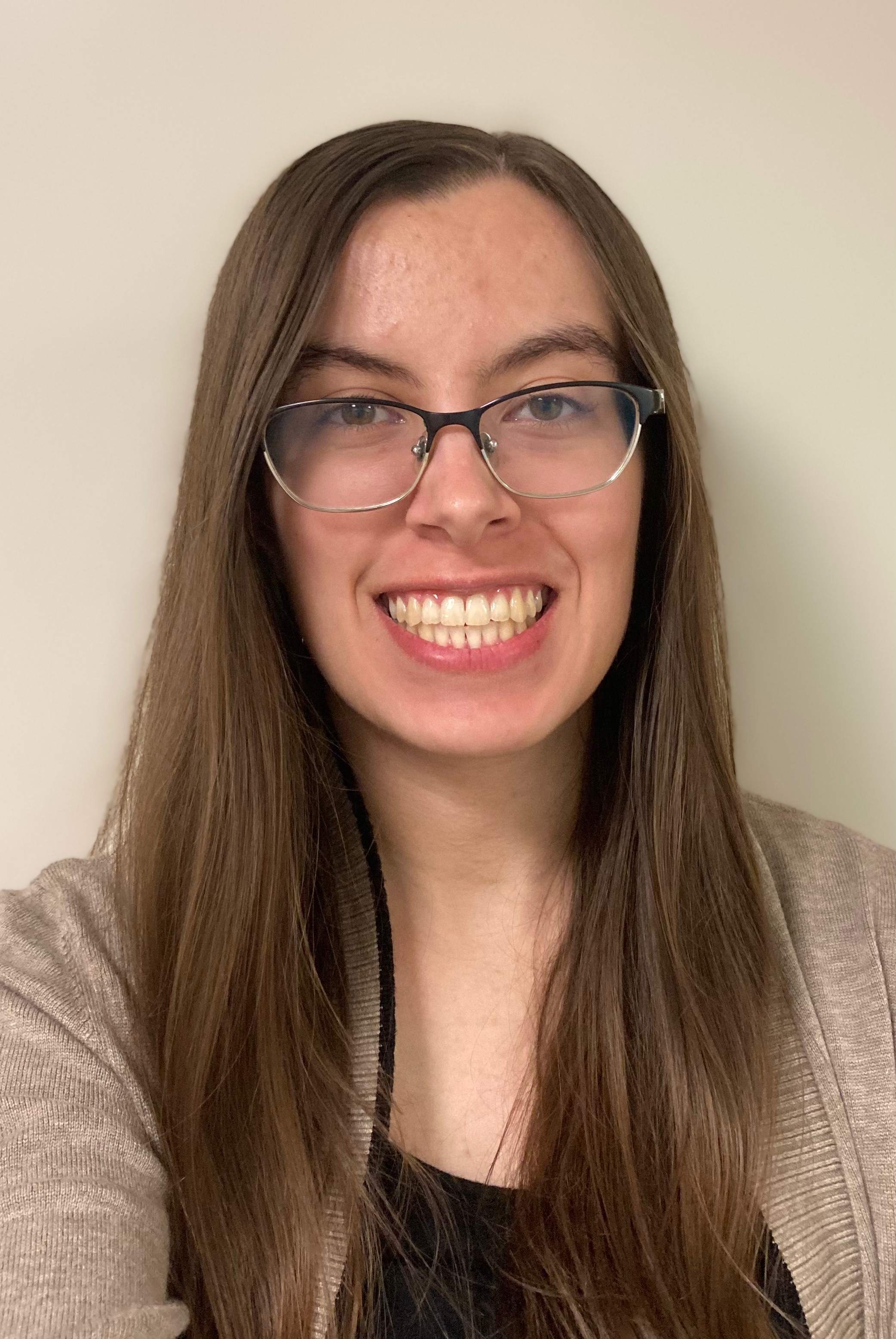
BIO
My name is Erica Peters, and I am a third-year student who is majoring in Biological Sciences. I am currently living in Freeport, Florida and transferred to Florida State University from the University of Pittsburgh in the fall 2023 semester. At the start of this spring semester, I became involved with the Hughes Fly Lab. I am interested in research in several topics related to biology, such as genetics, neuroscience, behavior, and ecology. Currently, I am undecided about my post-graduation plans, but would love to continue experiencing as many opportunities as I can here at Florida State.
Evolutionary Constraints Associated with Color and Aggression in Drosophila melanogaster
Authors: Erica Peters, Sarah N. RuckmanStudent Major: Biological Sciences
Mentor: Sarah N. Ruckman
Mentor's Department: Biological Sciences - Ecology and Evolution Mentor's College: Florida State University Co-Presenters: Carys Delahanty and Zoe Tsiapalis
Abstract
One long standing question in evolutionary biology is whether single genes that control multiple traits (pleiotropy) result in limitations on adaptive evolution. If it does, then our ability to predict adaptation (e.g., in the face of changing environments) is compromised. We are using a much-discussed correlation between body coloration and aggressive behavior as a system to address this question. In Drosophila, this correlation is possibly attributed to dopamine being a precursor to melanin production. Higher melanin production would then result in less free dopamine, possibly resulting in more aggressive behaviors. To test the prediction that darker individuals were more aggressive, we selected for darker and lighter flies (D. melanogaster) and periodically tested for aggressive behavior. Every 5 generations, we tested for aggression and photographed each individual. We used ImageJ to measure the color of the thorax of the fly. We found that the darker flies are more aggressive, suggesting a pleiotropic effect. Our results suggest that dark-selected flies evolved to be more aggressive. The next step in this study is to identify candidate genes underlying the correlation and test for pleiotropic effects using transgenic approaches.
Keywords: Genetics, Pleiotropy, Evolution, Behavior, Aggression


